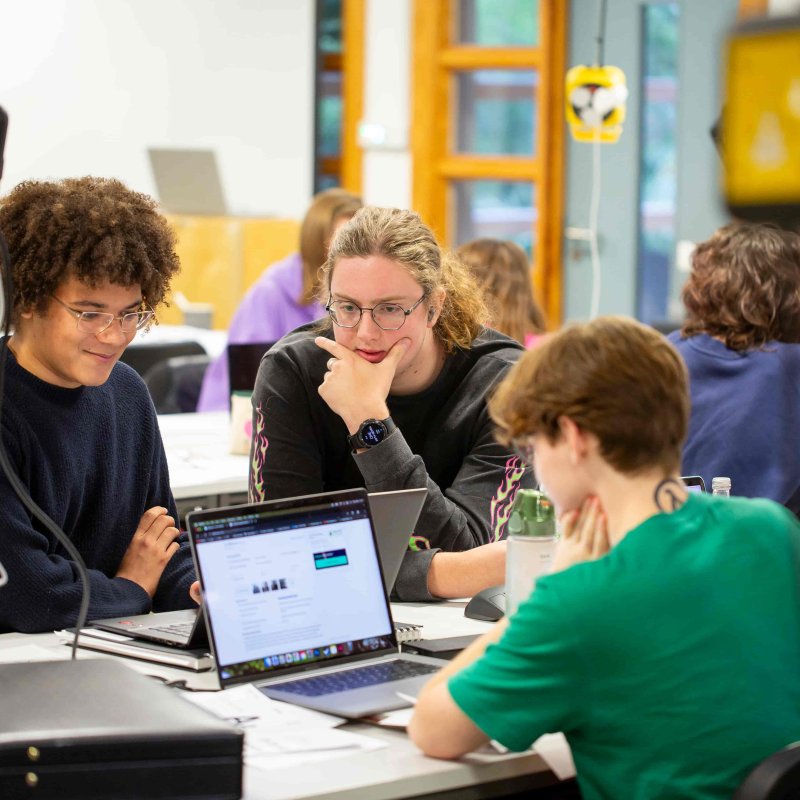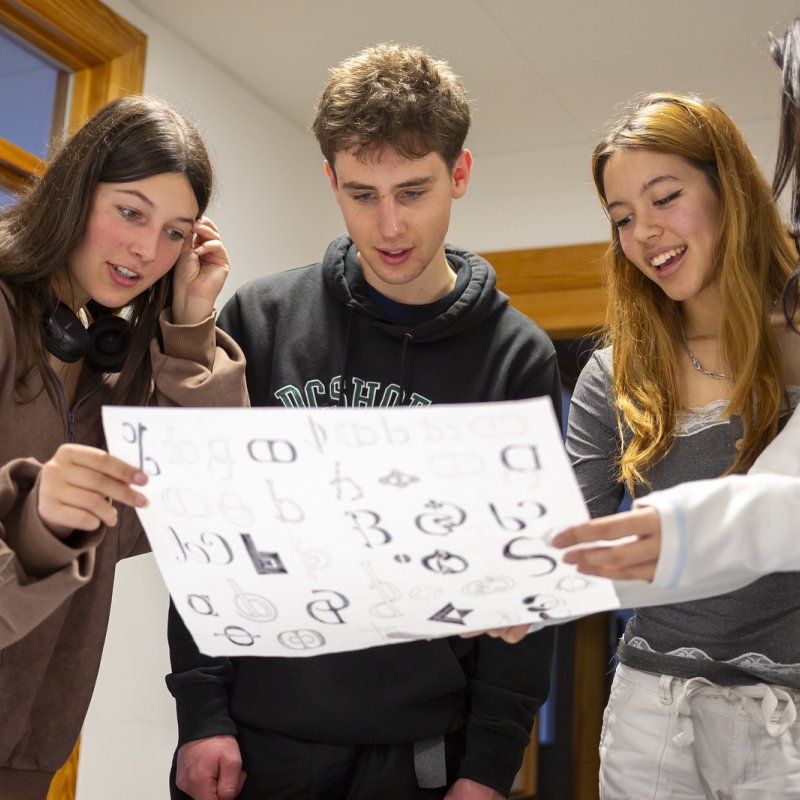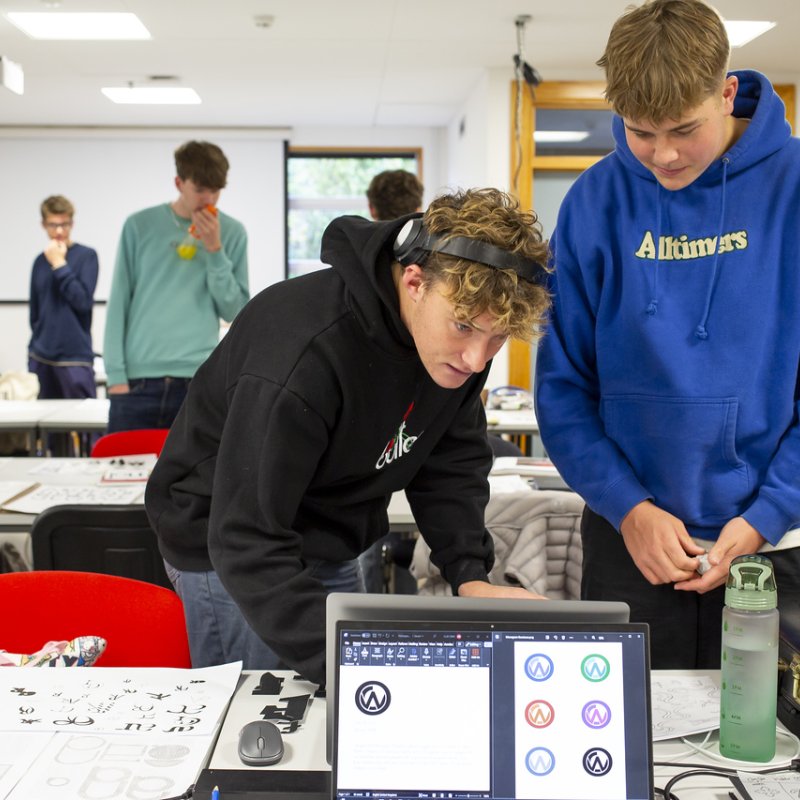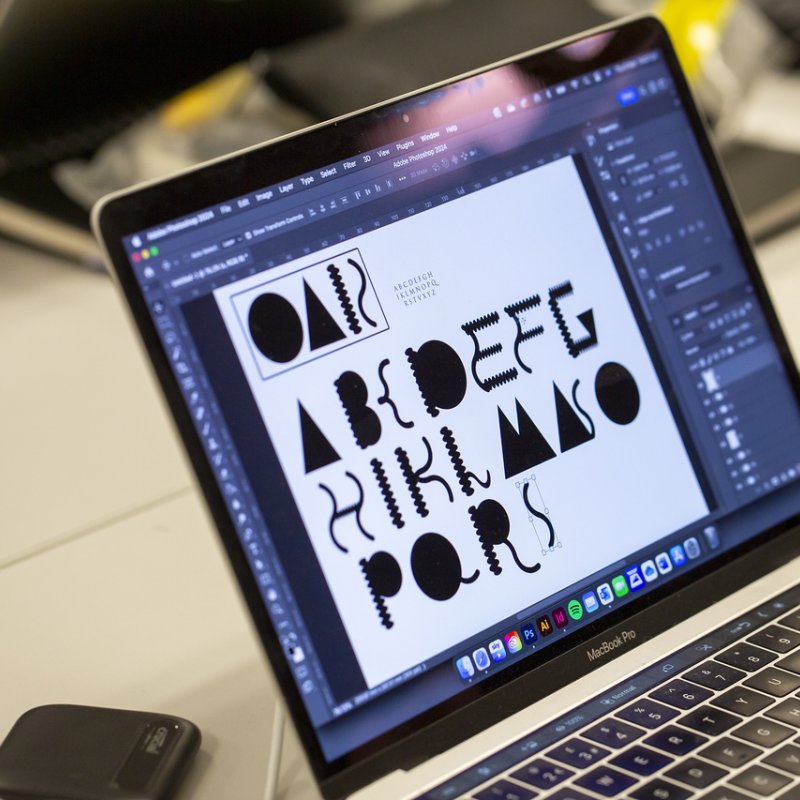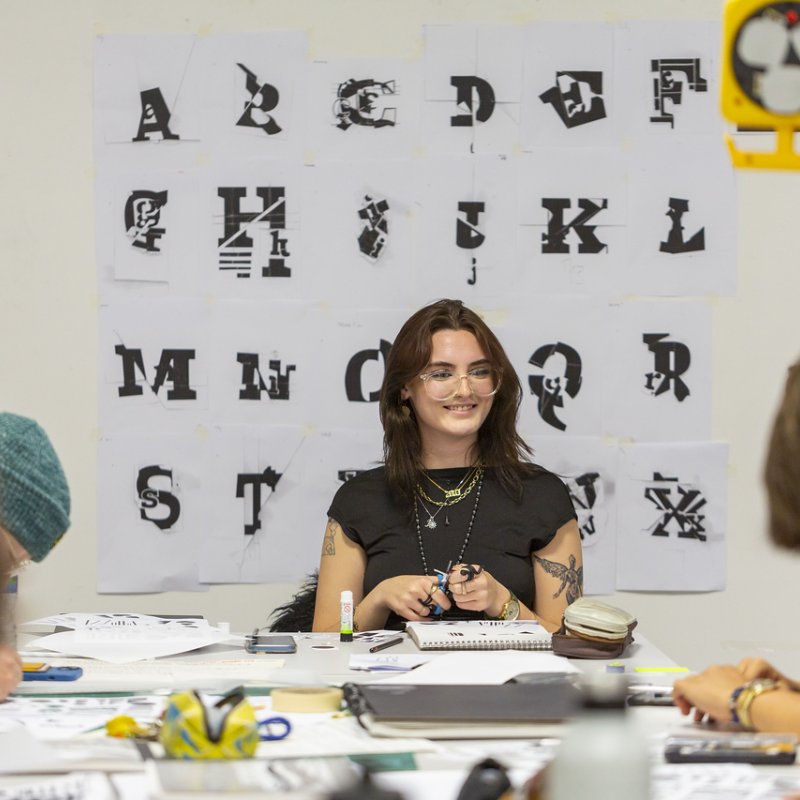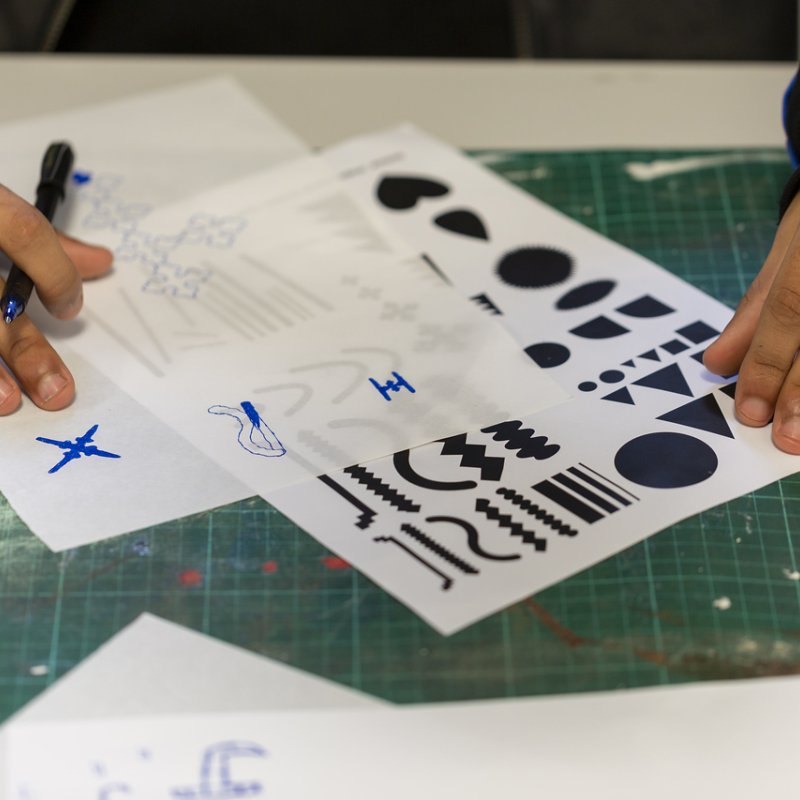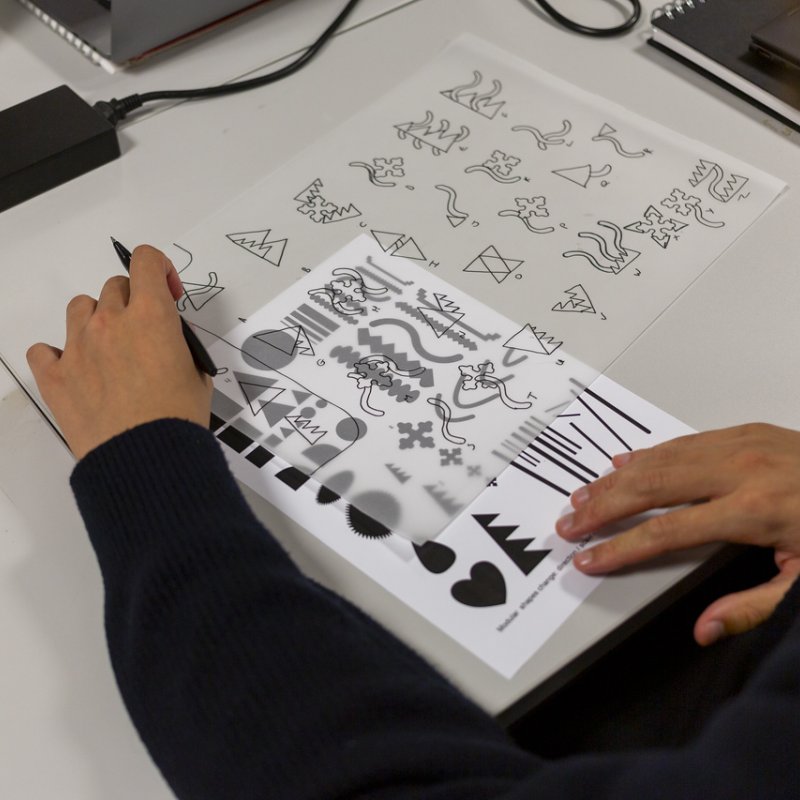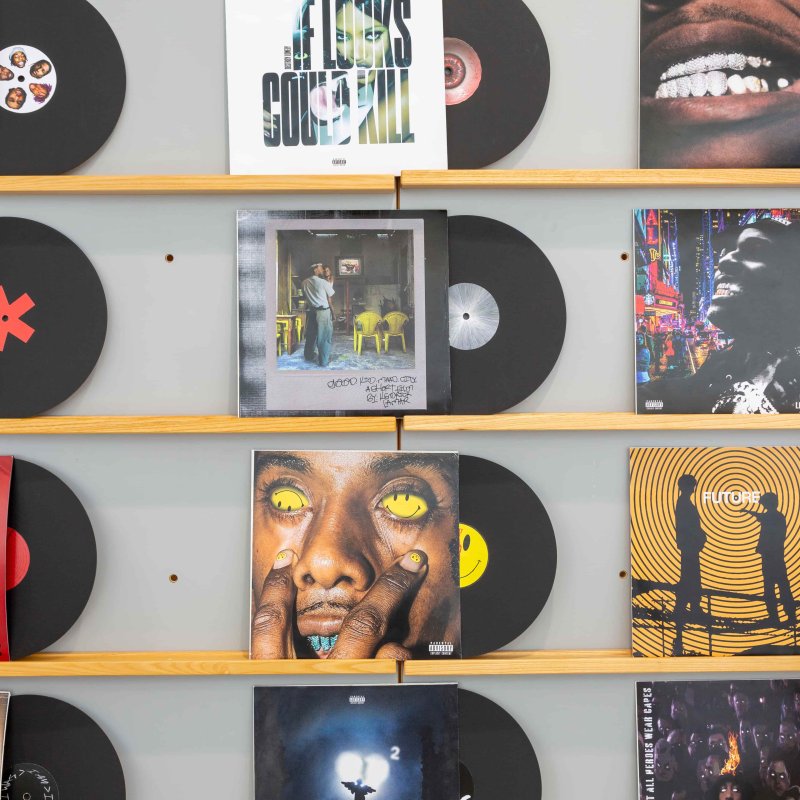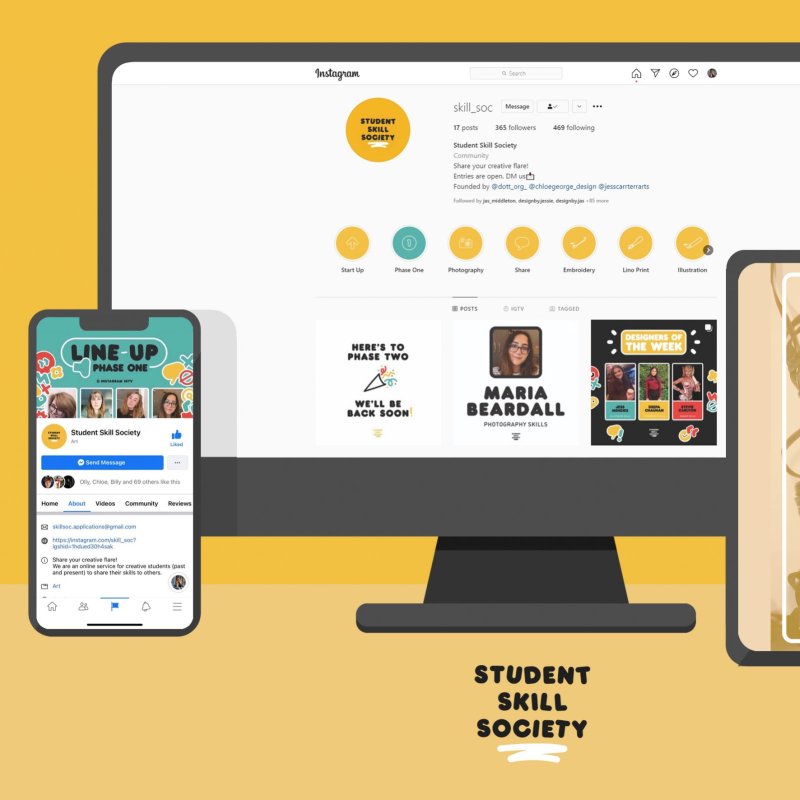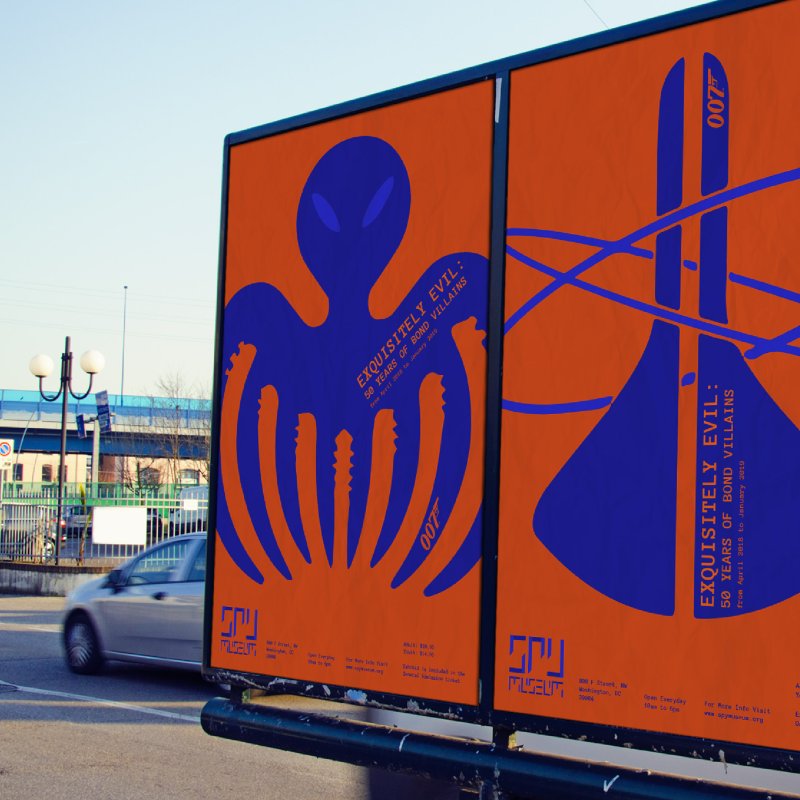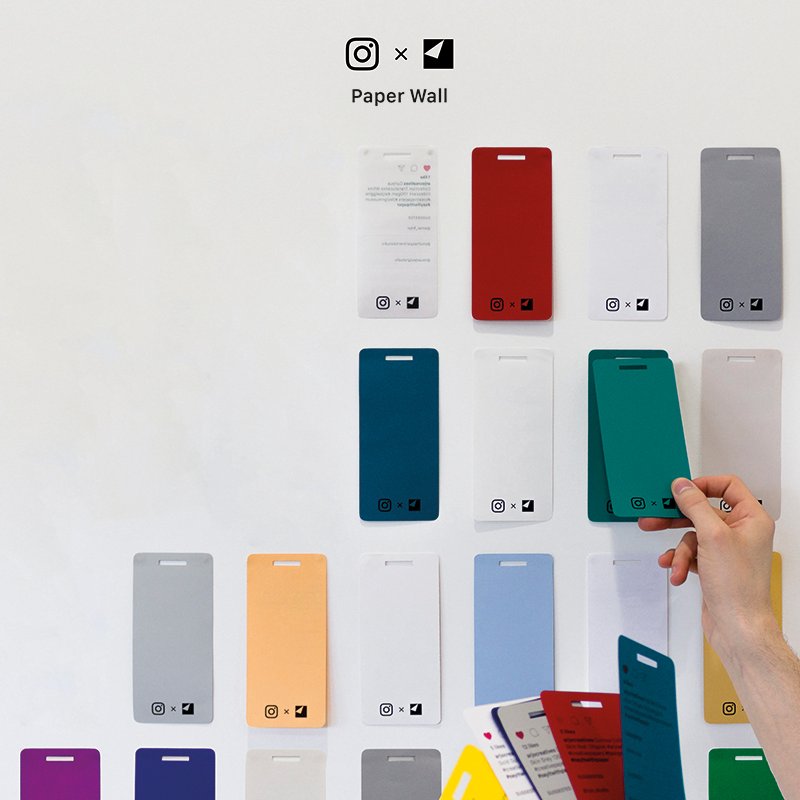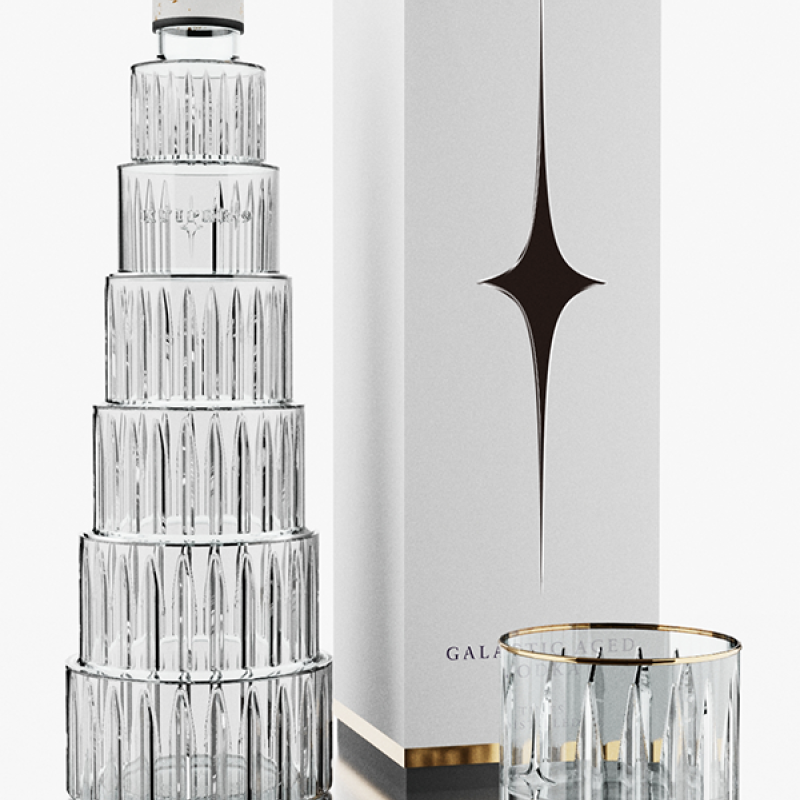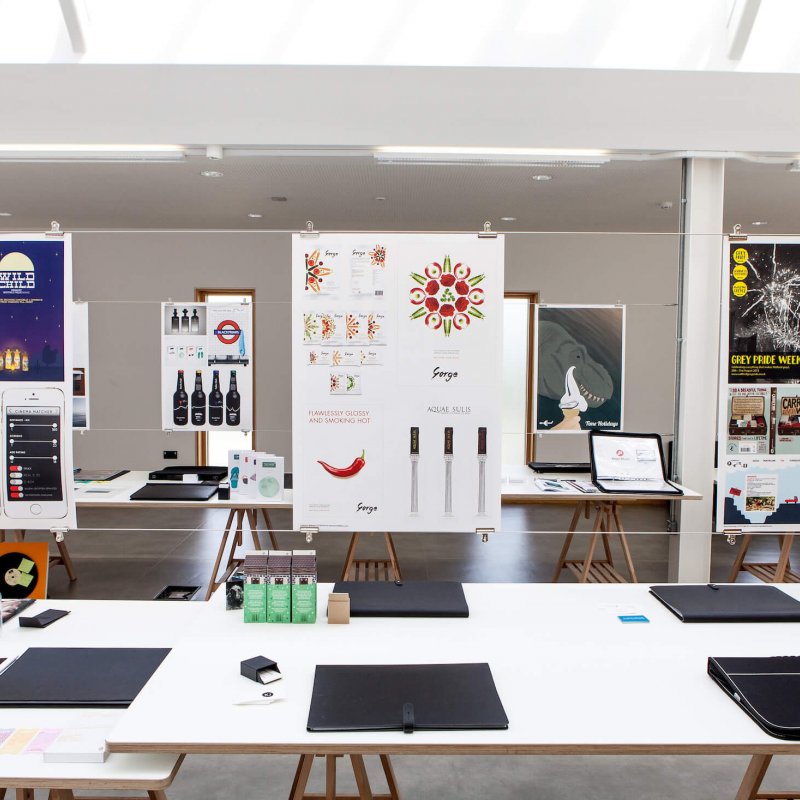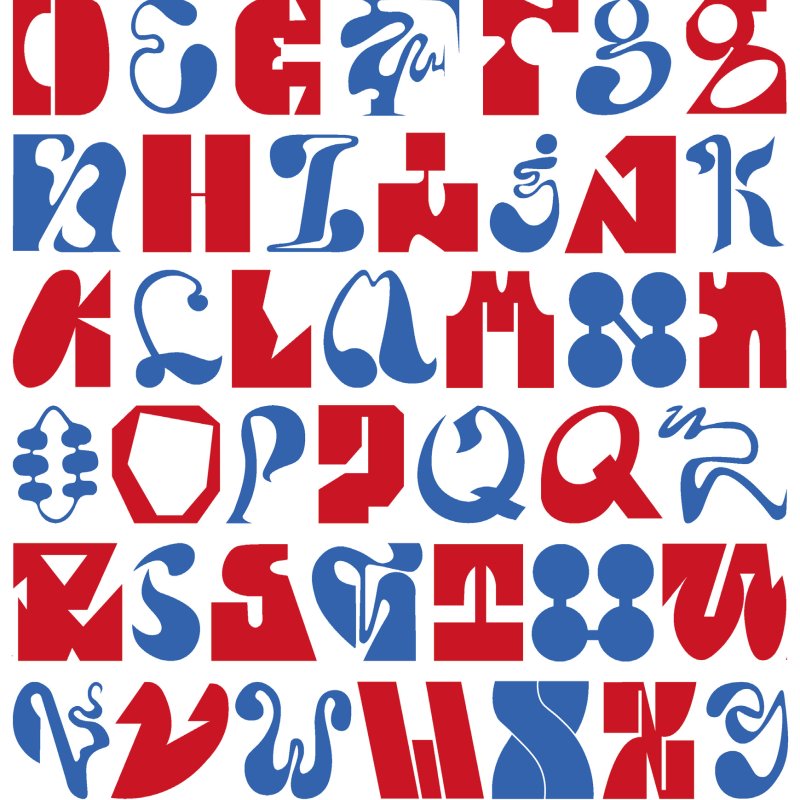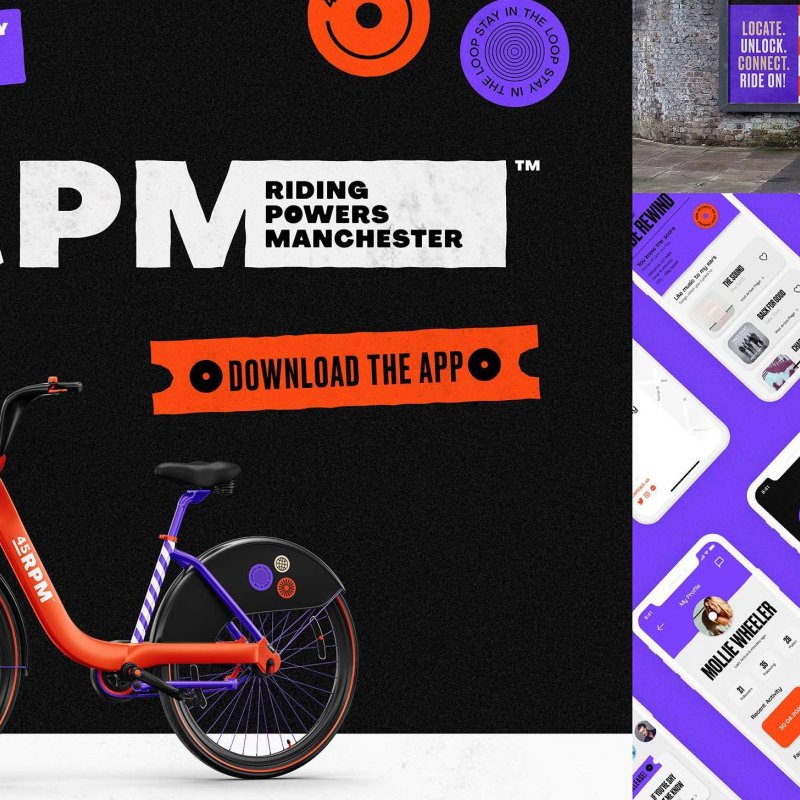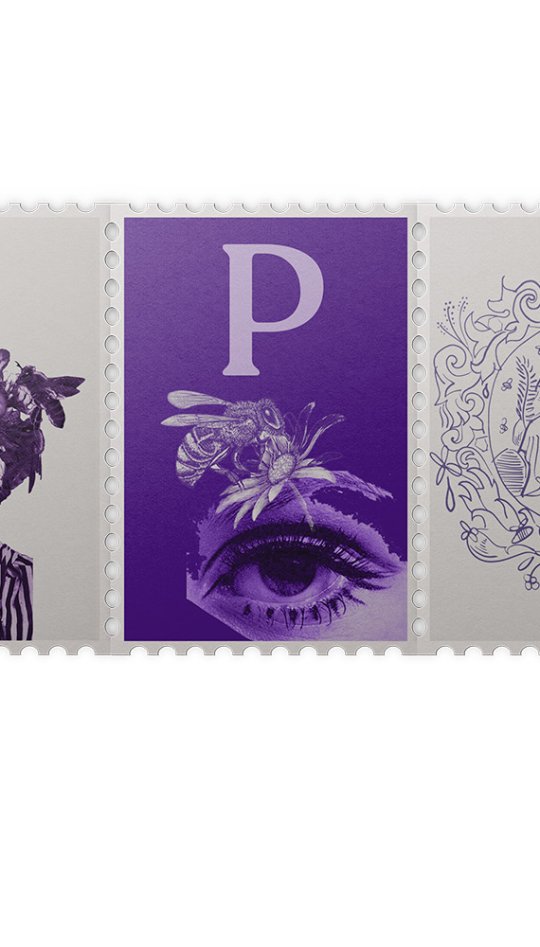
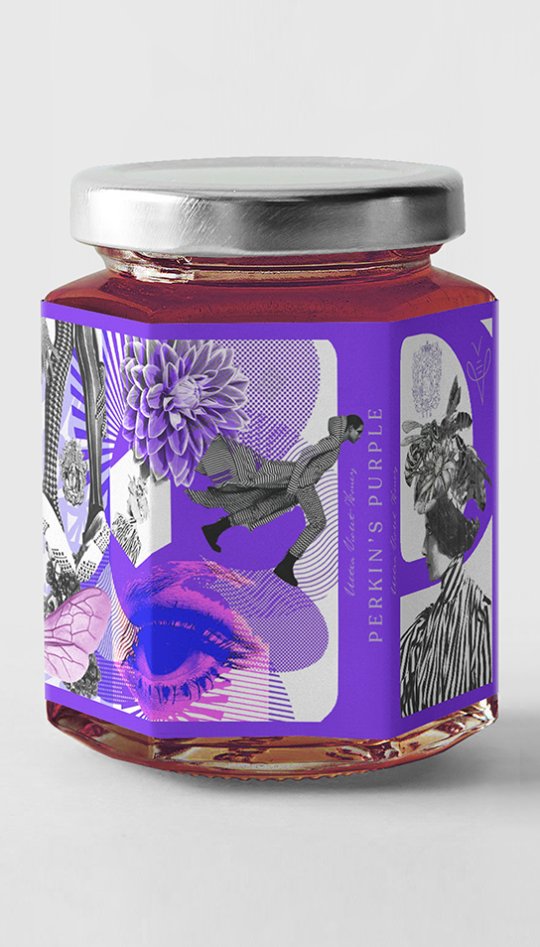
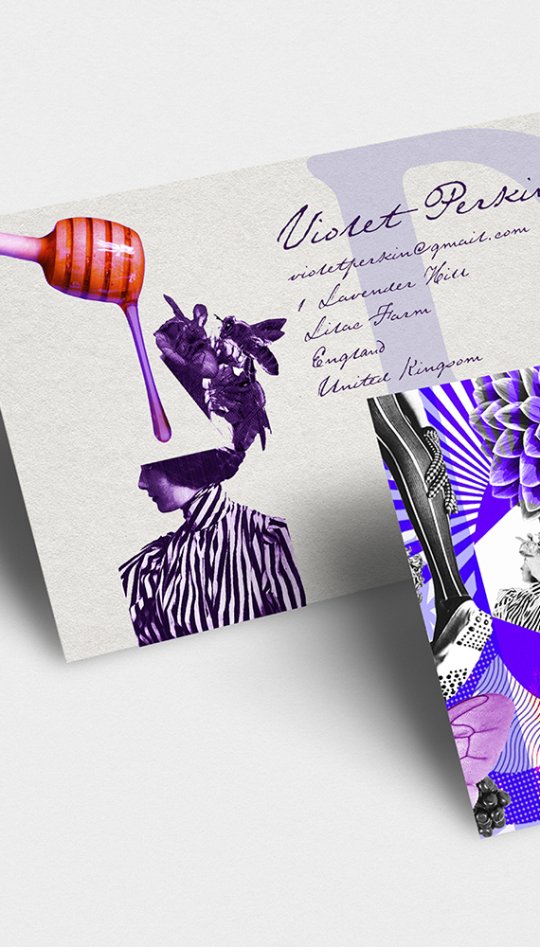
Graphic Design BA(Hons)
Redefine the world around you as an adaptable, articulate, visual communicator.
Course overview
Graphic Design is one of the most versatile visual disciplines, embracing words and pictures, form and structure, time and space. It’s also one of the most powerful; touching everything from the clothes we wear, the political ideas we believe in, and the way we shape the future of our planet. Good design thrives by looking for new ways to tell both familiar and emerging stories; it’s in clever ideas and beautifully executed outcomes, hand-drawn scribbles, and digital masterpieces.
Design is also undergoing massive change – much like the world within which our work exists and the way we are evolving as a university degree. Now, more than ever, we are looking for purpose-driven thinkers who can respond to human-centred communication problems, and create genuine, positive outcomes with lasting impact.
Why study this course at Falmouth?
- Be part of a thriving and immersive studio community that embraces innovation, champions risk-taking, and encourages creative collaboration.
- Consider the mechanisms through which design can highlight or disrupt problems in society, directly challenging the nature of the discipline and defining your own set of beliefs.
- Explore and question the process of design, visual language, storytelling, and craft – utilising both traditional and cutting-edge tools and technologies to support your ideas.
- Learn in one of the most unique locations in the world, at an independent art-specialist institution, where we nurture a deep connection with people, place, and planet.
- Work on human-centred projects developed by staff, leading industry practitioners, international competition schemes, and through your own enquiry – shaping the outcomes into a career-launching portfolio.
- Participate in key industry events, our optional study trips, and attend guest lectures from industry leaders, ex-students, and our award-winning staff.
- Explore Design as a tool for positive change, responding to environmental, ethical, and moral challenges, building together for your future.
Course details
On this Graphic Design degree, you'll have the opportunity to gain a BA(Hons) degree over three years or the option to study Graphic Design BA(Hons) with an Integrated Foundation Year and/or a Professional Placement Year.
With design process and clever thinking at its heart, the course explores how meaningful, creative ideas can be made. With its formidable connection to industry, award-winning graduates, and integration of theory and practice, you’ll be challenged to think holistically, responsibly, and differently. You’ll look ‘at’ the world around you, rather than be caught up in it.
Our arts pedigree, design-for-change ethos, and the stunning landscape that is Cornwall, shape this unique perspective into a highly desirable quality that is valued by the creative sector world-wide.
From module information, to course aims and assessment criteria, discover the full course details below:
What you'll learn
During your first year, you’ll be encouraged to explore, experiment and question new creative processes and practices, through both thinking and making. This will deepen your understanding of the breadth of the subject and will begin to shape the future of your unique creative journey. You’ll be part of a supportive and innovative studio culture, where together you’ll learn to grow your skills, develop multiple ideas, and embrace creative risk.
A variety of briefs, workshops, lectures, and presentations will introduce you to design process, visual language, collaboration, and storytelling.
Modules
Design is?
On this module, you will develop a hands-on understanding of what graphic design is, considering in some detail the creative processes and idea-generation techniques that help define the subject. Through playful, experimental, and disruptive ways of working, you'll broaden a sense of how key principles, habits and an awareness of your own practice can shape and define a viable design outcome.
Design from
The way we learn about graphic design is informed by a rich history of practical and critical discussion. This, in turn, shapes our understanding of how contemporary visual messages can be formed and read. This module provides the opportunity to experiment with (and to challenge if necessary) the building blocks of design language, so you can craft clear messages in response to a variety of current communication challenges.
Design beyond
Here, you’ll practically consider the relationship between design, storytelling and ‘purpose’ when delivering a message. Utilising a variety of media; from human (analogue) through to non-human (AI), and enhanced ways of developing idea generation, you’ll begin to take more ownership of the future direction of the subject (and your degree).
Design with
This module is the backbone of the course, where you’ll be part of live and/or research-led studio projects, working collaboratively with staff, fellow students (from years 2 & 3), and designers from the wider creative community. Projects will invite you to respond to questions and solutions that can positively impact society and our natural environment. The ambition here is to move your thinking beyond the immediate, and to begin functioning at the forefront of the discipline.
In your second year, practical, hands-on thinking is re-considered in the light of historical, theoretical, and critical points-of-view. You will consider the process, craft (including the role of evolving technologies), and context of graphic design in much greater depth. You’ll also explore the role of designer as translator, disruptor, collaborator and facilitator.
Briefs, workshops, lectures, and presentations are complimented by in-depth learning about experience design, brands and consumer culture, typography and information hierarchy, the ethics and responsibility of design practice, design for society and teamwork.
In exploring these themes, you’ll also be encouraged to consider opposing perspectives to the accepted norms, and to wrestle with the tension these areas of design can create.
Modules
Design for
Here, you’ll consider how graphic design has been used for facilitating a conversation between message and audience in the delivery of an idea. Experimenting with visual hierarchy, typography, and content creation, together with a broad range of media, branding, and environmental applications, you’ll consider the role design can play in shaping the effective delivery of a point-of-view or strategic goal.
Design against
On this module, you’ll explore a designer’s place as a radical instigator, activist, and disruptor. There is an urgent need for us to question our actions, become catalysts for change and to consider more fully our responses to the world’s current urgencies (ecology, degrowth, the rich/poor divide, and so on). Historical examples and future scenarios are considered to help develop more radical approaches to behaviour-change in the face of global crisis and how creativity can offer powerful, resilient, and impactful solutions.
Design towards
Here, you’ll be introduced to the role of designer as an agent of positive social change – asking the question, ‘How do I use my skills to build a better world?’. This module marks a central shift in the focus of the course, where you become both the writer and designer of your own self-authored projects. This will enable you to engage with a range of user-centered communication challenges and the research methods to support social innovation across a variety of sectors.
Design with
This module creates a more clearly defined platform for research-led studio projects, where you’ll again work collaboratively with students across year groups (years 1 & 3), with staff, and with external partners. Projects respond adaptively to challenges impacting society and the environment – ensuring each opportunity is at the forefront of the discipline. Briefs are often undertaken in partnership with business, NGOs and/or researchers to inform the scope and the potential of cross disciplinary working, and you will adopt a more central role in the life of a design team.
You can choose to take an optional professional placement after your second year on a three-year programme, or after your third year if you’re studying for a degree with an Integrated Foundation Year.
You’ll be responsible for finding your own placement, with support from the Employability team.
Choosing this option will enhance your industry experience and skills while studying.
How you’ll study during your professional placement
You’ll spend time working in a professional context, as part of a business or organisation. This can be in one role, or up to three, and must be for a minimum of 24 weeks.
You’ll develop in-demand workplace skills, deepen your insight into industry and grow your network of contacts, all of which could help you get ahead in your career after graduation.
Throughout this year, you’ll develop a portfolio of work that includes critical self-reflection on what has been learned from the experience. You’ll be required to evidence your experiences, the skills you’ve learned and your professional growth.
In your final year, you’ll select (or write) a variety of projects that continue to test and challenge your emerging areas of interest, culminating in a final portfolio of design work. These projects will allow you to build on core skills and reflect critically on your individual strengths – while still exploring alternative models of practice that help define a design future beyond your degree. They will also turn your thinking into highly ‘graphic’ outcomes, utilising the best technologies for each idea and celebrating your skills as an all-round practitioner.
You’ll begin the year with a variety of workshops that encourage you to consolidate your practice, explore possible design futures, take on a leadership role as a collaborator, and finally culminate your studies – defining what you believe ‘Design is…!
Modules
Design as
This module is designed to kickstart your final year of study with more experimental and critical approaches to your work. Projects are run at different levels and speeds to help you re-orientate and confirm your interests and skills. Beyond the opening weeks of set projects, you are then encouraged to develop self-initiated design projects that probe the boundaries of the subject. These cover the spectrum of applied design (working for a ‘client’) or authorial design (working for yourself) and begin to shape what design means to you.
Design works
Here, you'll consider the context of design beyond university, exploring future ways of working that are framed around more traditional, fictional and/or experimental forms of studio practice. Across the module, you’ll work individually or collaboratively on a range of client, competition, or research orientated briefs, building a body of knowledge that will prepare you for innovative, future-facing studio experiences.
Design is!
On this module, you’ll realise your own perspective of what Design Is…! – bringing together insights and ideas developed from across the course. This is demonstrated through a rich body of work closely linked to your interests and ambitions. Projects can be developed from previous thinking or through new emerging areas of focus – all of which underpin and support your future aspirations.
Design with
This module provides a definitive platform for research-led studio projects. Here, you will help lead and support a variety of initiatives, working collaboratively with students across year groups (years 1 & 2), staff, and external partners. Mirroring the other ‘Design with’ projects already undertaken earlier in the course, you’ll lead on adaptive responses to critical themes in any given year – moulding and driving debate at the forefront of the discipline.
Why study an Integrated Foundation Year route?
If you’re taking on a new subject that you haven’t studied in depth before, have been out of education for a while or have a non-standard educational background then an Integrated Foundation Year degree may be the right choice for you. It is a four-year degree with an Integrated Foundation Year to start, which allows you to explore the primary elements of your subject before progressing on to the remaining three years of the BA(Hons) degree.
What you'll study in your Foundation year
If you choose this pathway, you'll study five core modules in your Foundation year. These are all designed to help you explore the foundational elements of your subject. You'll gain relevant technical skills, learn to experiment and take risks, develop an understanding of professional practice, have opportunities to work across disciplines and collaborate with other students on live project briefs.
Modules
Explore
You'll begin your foundation year by working collaboratively with others to explore themes of the future. You'll take risks, experiment through play and be supported to break through barriers.
Technique
You'll take subject-specific workshops and develop essential technical and practical skills in your area of study. You'll also enhance your analytical and organisational abilities.
Apply
You'll work with your peer group to think beyond discipline by addressing a societal or global issue. You'll then showcase your work to your peers and deliver and accompanying evaluation of your process.
Industry
You'll enhance your creative and practical skills in your subject specialism by responding to typical industry briefs, underpinned by focused research and experiments. You'll also gain industry insights through guest lectures and workshops.
Launch
You'll develop your unique identity in your specialism through the production of a self-initiated body of work. Your final project will be the bridge to your next year, fully supported by evaluative reviews and critical analysis of the work you have created.
After the Foundation year, you progress into Year One of the full three-year degree, equipped with a deeper knowledge of your subject, a clear understanding of your strengths, and develop a practical and technical skillset and the confidence to excel in your chosen subject.
If you apply for and enrol onto a degree with an Integrated Foundation Year, you’ll have the option to switch onto a five-year version including a placement year. That means you’ll complete the first three years of your course before completing a placement in industry in your fourth year and returning to Falmouth for the fifth year of your programme.
The modules above are those being studied by our students, or proposed new ones. Programme structures and modules can change as part of our curriculum enhancement and review processes. If a certain module is important to you, please discuss it with the Course Leader.
Facilities
Based in the School of Communication, our Graphic Design facilities include:
- Purpose built design studios to embed collaboration and professional approaches to collaboration.
- Seminar spaces to allow for industry level discussion and debate
- Analogue craft skills facilities, including screen printing, printmaking (inc. Woodblock Letterpress) bookbinding, woodworking and life drawing
- Digital computer suites, laser cutting, rapid prototyping and 3d printing
- Range of digital printing for A4 to large scale prints
- Highly skilled technicians who can support the development and delivery of your ideas
- Hire of sound, photography and film equipment from Falmouth stores
- Sound and photography studios for multi-media recording and production needs
- Across the wider university and at the Penryn Campus, you’ll find an extensive range of equipment across all art and design practices, that can be used, subject to project need and approval from tutors.
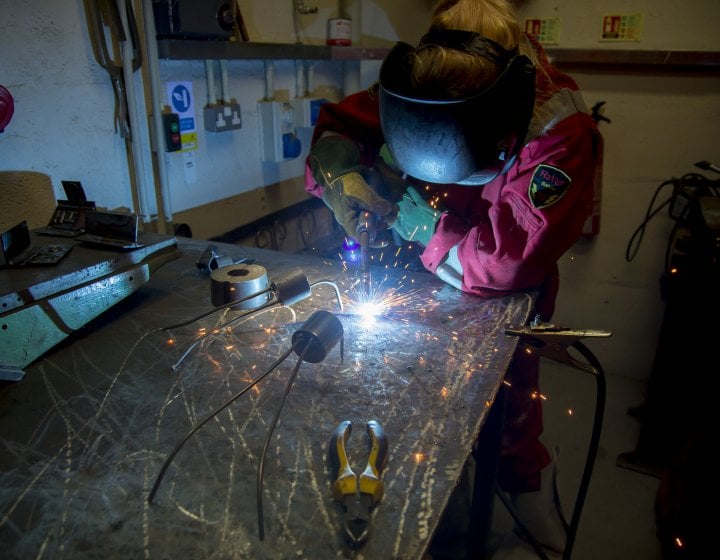
Art & Design Facilities
Primarily located at the Falmouth Campus in a subtropical garden, our studios and workshop facilitie...
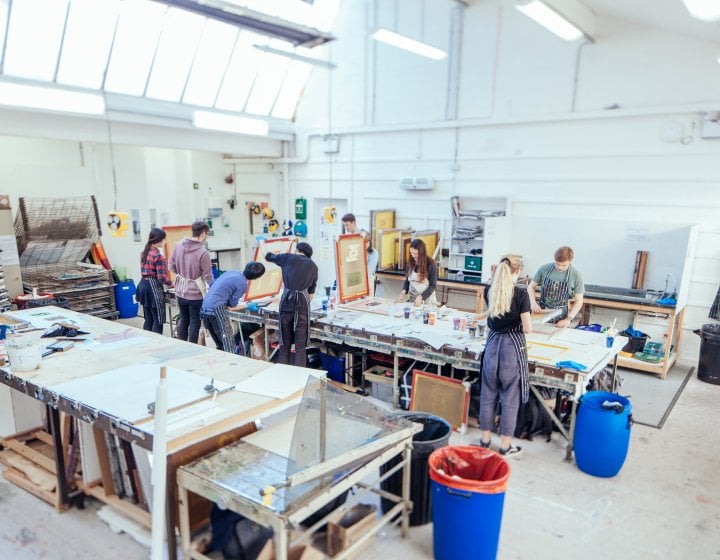
Printmaking Facilities
We facilitate a range of printmaking techniques and encourage both traditional and non-traditional p...
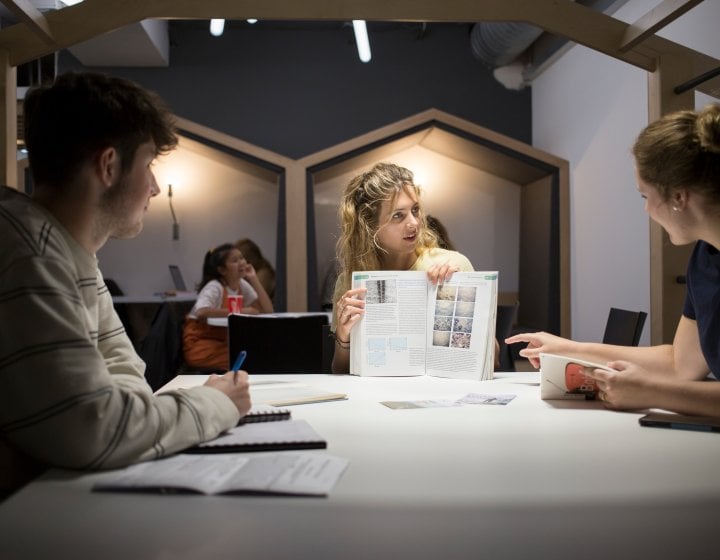
Library Facilities
Offering extensive collections, our two libraries provide a wealth of digital resources, magazines, ...

Sports Centre
Our Sports Centre, on Penryn Campus, includes a spacious gym with up to 90 of the latest, new statio...
How you'll learn & be assessed
Your learning and teaching experience will be centred around dedicated studios. There are also shared spaces, including seminar rooms, lecture theatres and workshops, where you’ll receive inductions in the various and wide-ranging skills that a professional graphic designer is expected to use today.
Alongside being taught by full time staff who have a wide range of industry and academic experience, we also have visiting lecturers from across the UK and around the world. These provocateurs introduce a variety of professional practice insights, that will inspire you and help you prepare you for the start of your career.
In terms of your studies, we reflect an approach largely based on strong studio practice methods all designers use. This includes getting you to talk about your ideas and present to a variety of audiences and in different informal and formal situations. These can include one-to-one tutorials, seminars, lectures and supervised time in the studio.
We’ll also have specialist inductions, IT skills training and masterclasses that are typically held when we welcome visiting lecturers.
There is also an emphasis on you to manage and develop your work and time, so you gain the appropriate motivation to drive your own academic and career aspirations. You can rely on staff to direct you through regularly weekly briefing sessions and manage our digital learning space where all your learning materials and lectures will be archived each week.
100% of your assessment will be coursework.
Assessment methods:
- Opportunities for ongoing feedback & review happen weekly (normally every 2–3 days), with both staff and other students.
- The work you submit is normally ‘graphic’ (i.e. visual in nature) but also will include some written and physical elements.
- Sketchbook & development work is as valuable as the traditional ‘outcome’.
- Your work is assessed in response to a variety of design briefs & workshops.
- It is assessed against a ‘design orientated’ criteria shaped by the course team and informed by the best of industry practice.
- Formal assessment occurs after each module (normally twice yearly).
- In year three, you’ll exhibit your work for assessment as part of a final-year show.
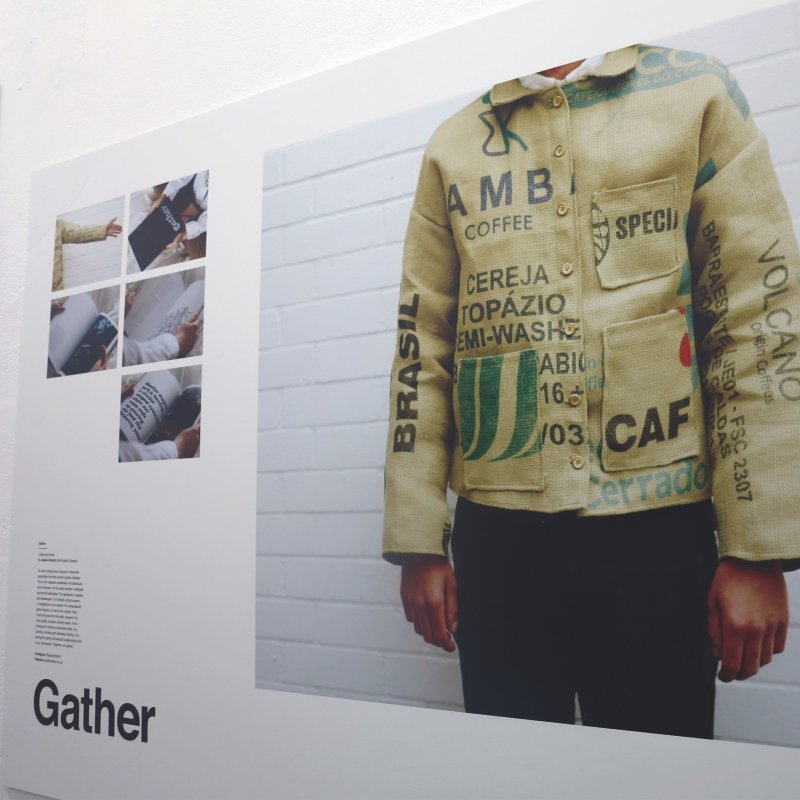
Work by Jessie Herbert
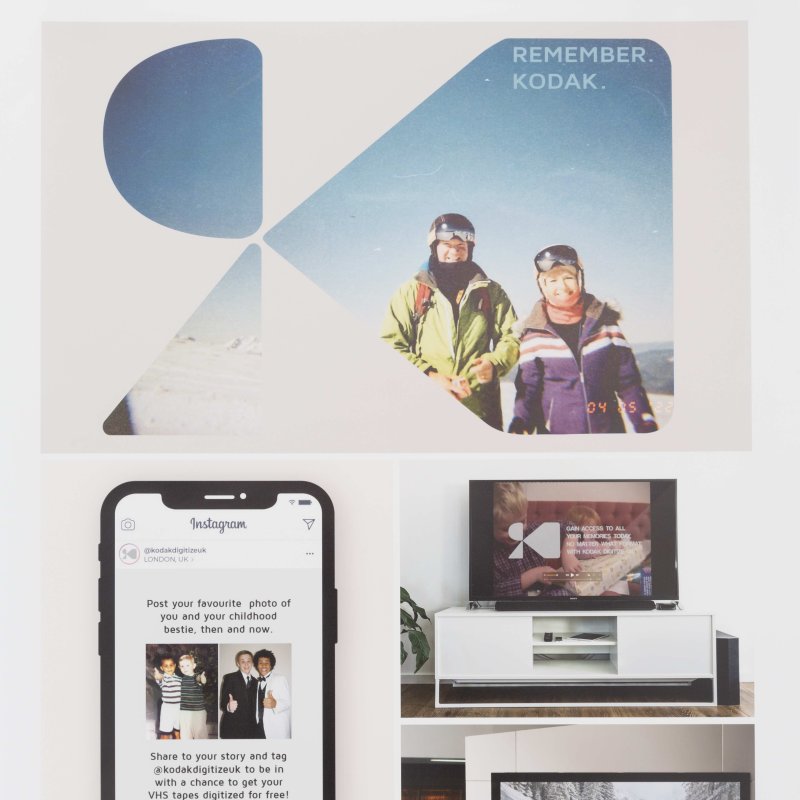
Work by Polly Warren
This course could be for you if...
- You want to develop quality ideas that push your creative process.
- You want to investigate questions relevant to the modern world through your work.
- You like thinking critically about your work and want to contextualise it in our current culture.
- You want to learn how to tell compelling visual stories.
- You enjoy making work that’s relevant to different audiences.
- You have a passion for visually and verbally articulating ideas to others.
- You like exploring, drawing, and making ideas through a number of media types.
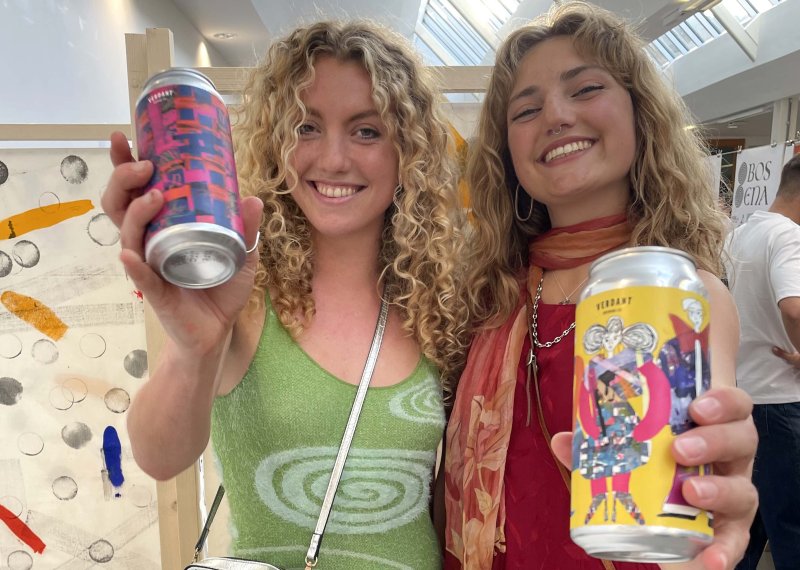
Verdant are one of the most celebrated craft breweries in the UK and Adam (founder) and James (Creative Design Manager) are Falmouth Graphic Design alumni.
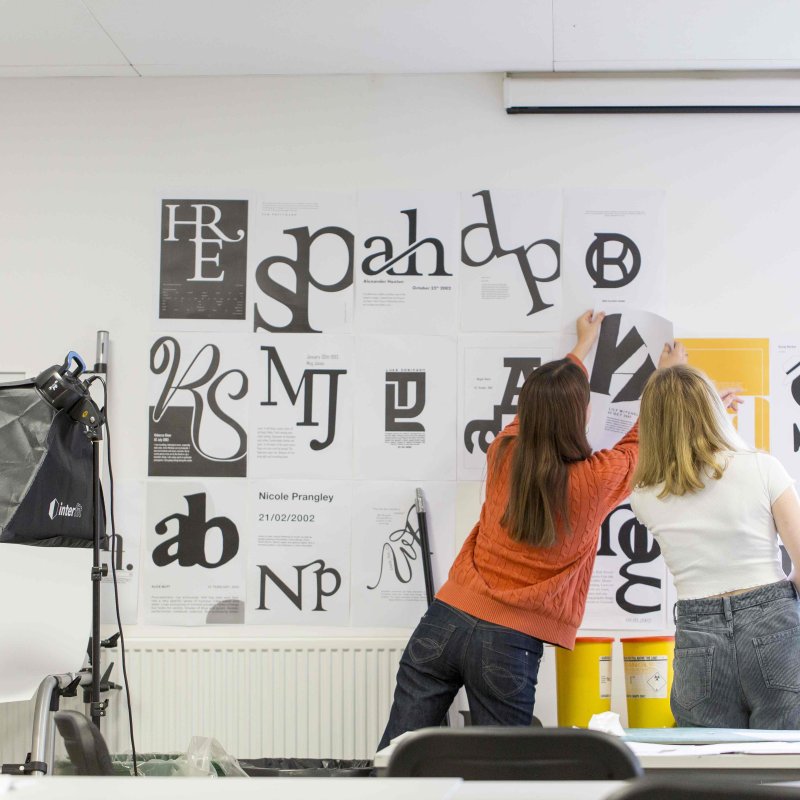
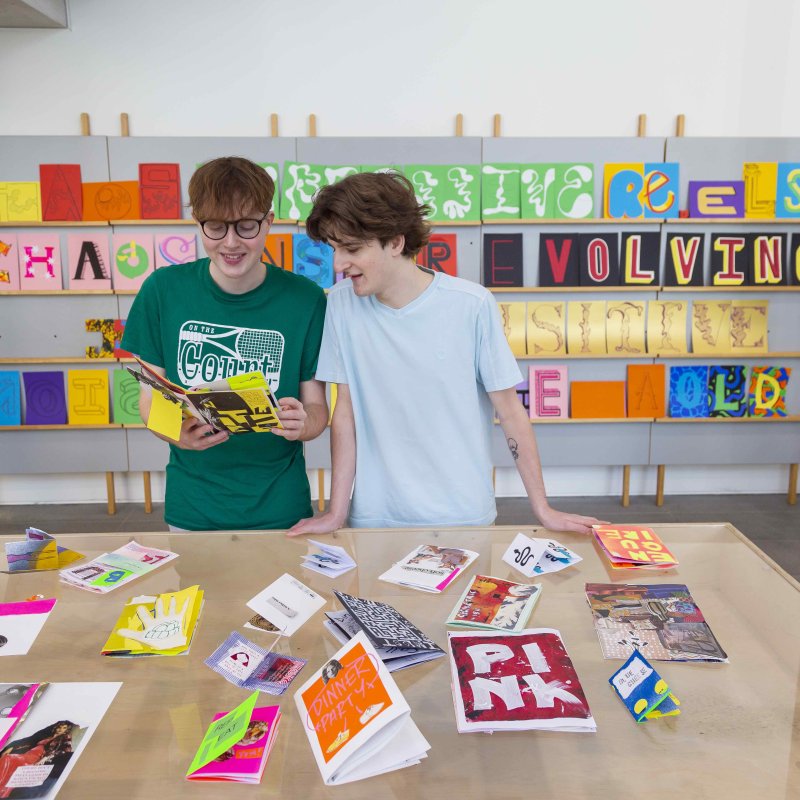
Staff
Our award-winning team all share a passion for the graphic ‘idea’ and a design ‘process’. They are engaged in commercial practice, writing books, contributing to key publications, and several are invited to judge both student & professional design awards. Their broader research draws from a wide range of themes and is centred around re-defining the discipline as a question, as much as it is an answer.
Some members of staff only teach on specific modules, and your course might not feature every staff member who teaches on the course.

Bryan Clark
Head of Graphic Design
Bryan leads the subject of Graphic Design at Falmouth and is responsible for the undergraduate degre...
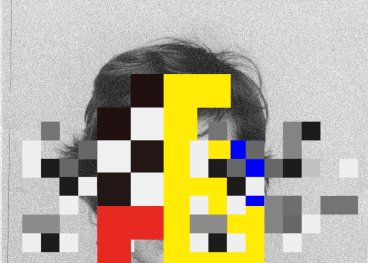
Dr Robyn Cook
Senior Lecturer
Dr Robyn Cook is a senior lecturer in the Department of Graphic. Since 2023 she has worked ...
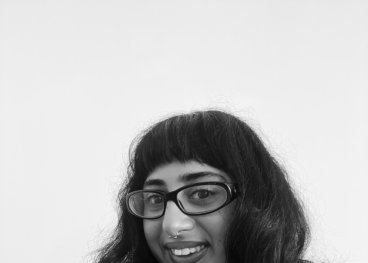
Sneha Modhvadiya
Lecturer
Sneha is a designer who specialises in typography, print, code, and curatorial design. She graduated...
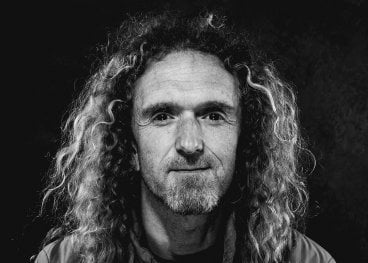
Andy Neal
Senior Lecturer
Andy's career began as a musician; composing and performing material with Detritus, and recording th...
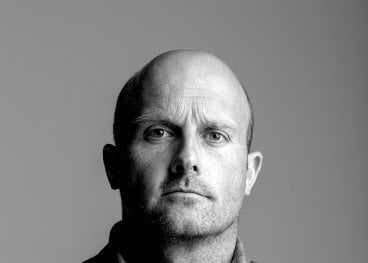
Ashley Rudolph
Senior Lecturer, Graphic Design
Ashley is a Senior Lecturer in Graphic Design within the School of Communication at Falmouth Univers...

Nicola Salkeld
Senior Lecturer / Course Co-ordinator (Stage 1)
Nicola is one half of MOTH, which is a research project, that investigates the skills and contributi...

Dion Star
Senior Lecturer, Graphic Design
Dion has been a senior lecturer at Falmouth University on the BA(Hons) Graphic Design course since 2...

Kate Christman
Senior Lecturer
Kate is a Senior Lecturer in Graphic Design within the School of Communication at Falmouth Universit...
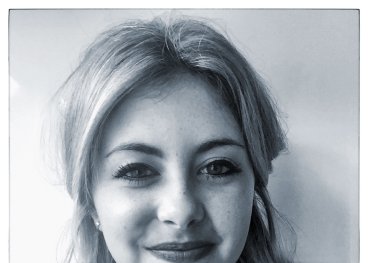
Chelsea Carter
Lecturer, Graphic Design BA(Hons)
Chelsea is a Lecturer in Graphic Design at Falmouth University within the School of Communication. C...

Steve House
Senior Lecturer
I've spent 16 years working in the creative industry and have been involved in creative education fo...
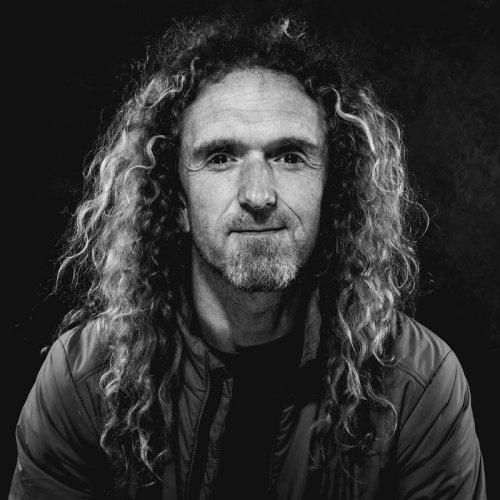
Got a question about this course?
If you want to know more about the course structure, our application requirements or what our graduates have gone on to achieve, our friendly course team is here to help.
Chat to Andy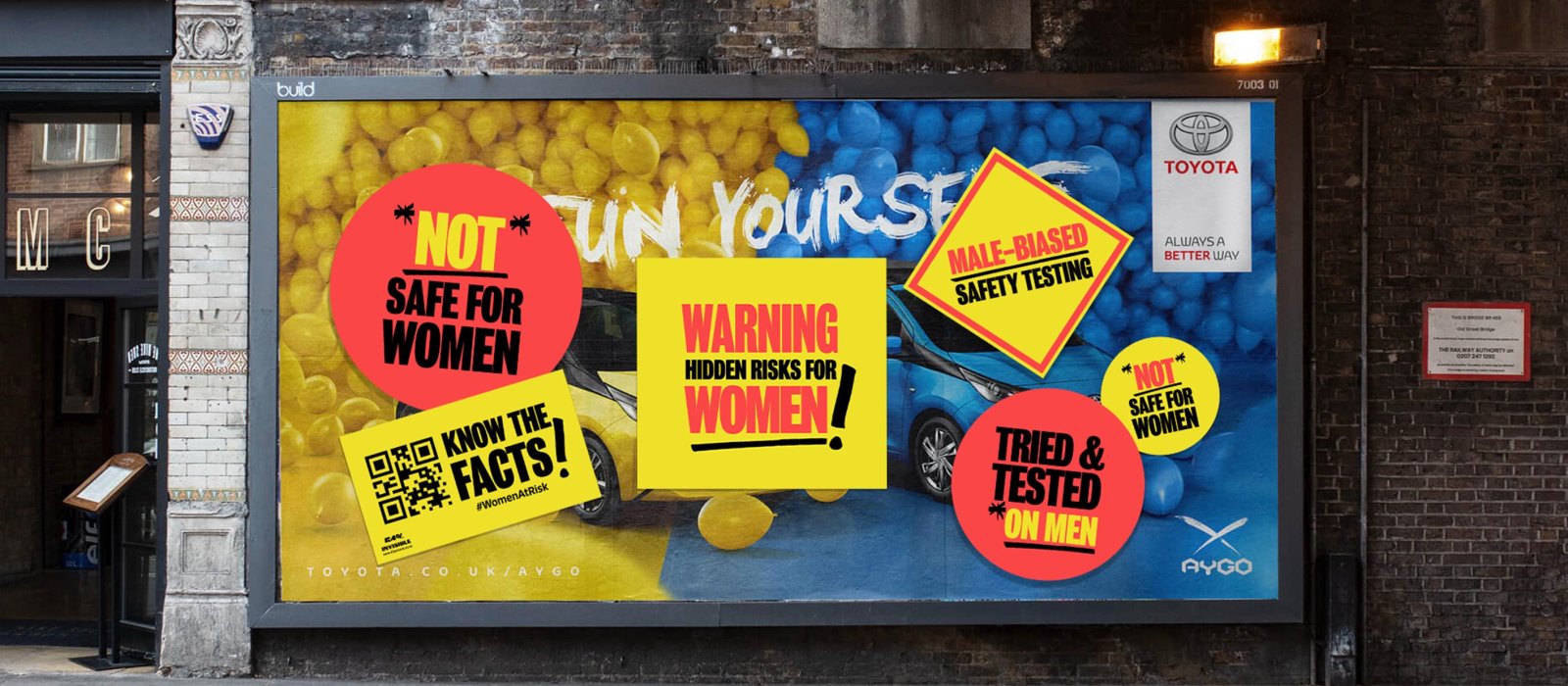
Work by Amy Whittaker
Stories from our community
Explore student projects, graduate successes, staff news and industry insights
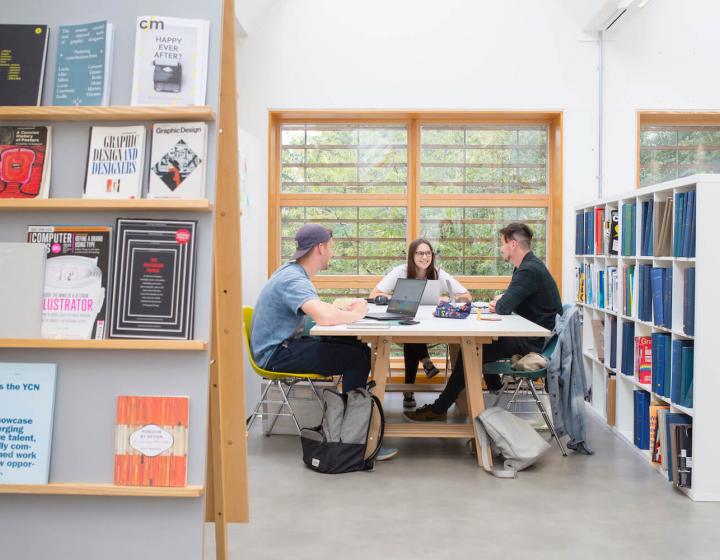
Why I chose to study Graphic Design at Falmouth
09 January 2024
Applying to university can be a difficult decision! Deciding where and what to study, you might feel...
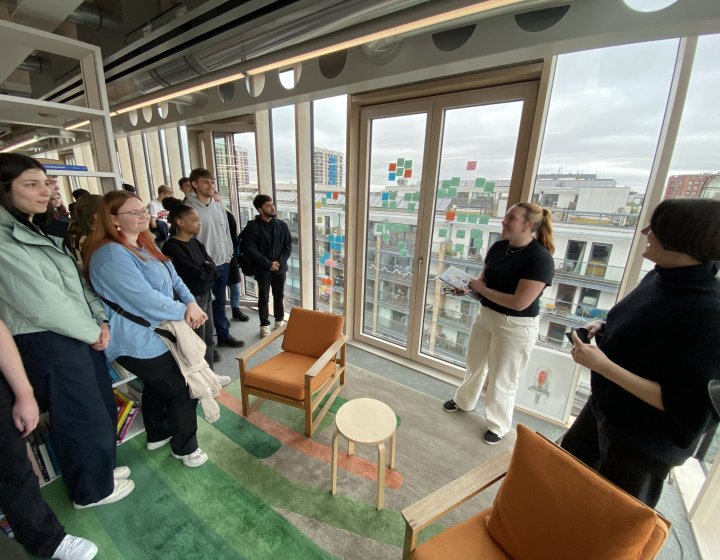
Graphic Design and Communication Design students take to the capital
09 May 2024
Earlier this spring, a group of Graphic Design BA and Communication Design MA students visited Londo...
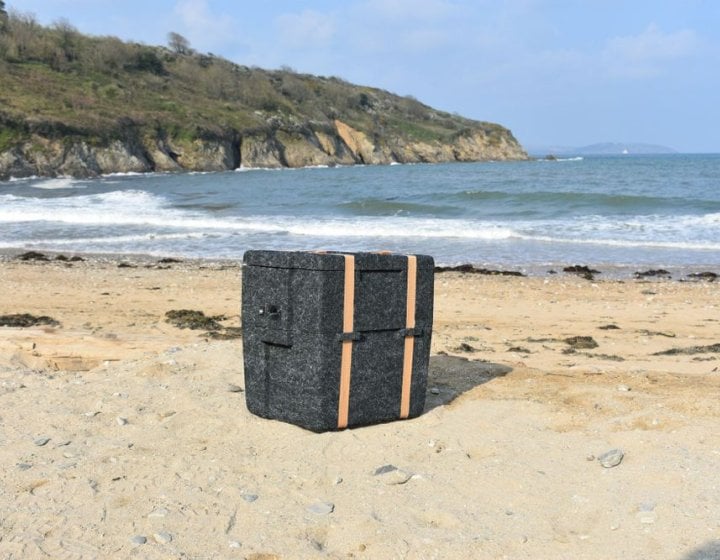
Falmouth University students and alumni win big at Creative Conscience Awards 2023
11 October 2023
The awards cement our reputation for championing ethical and sustainable practices.
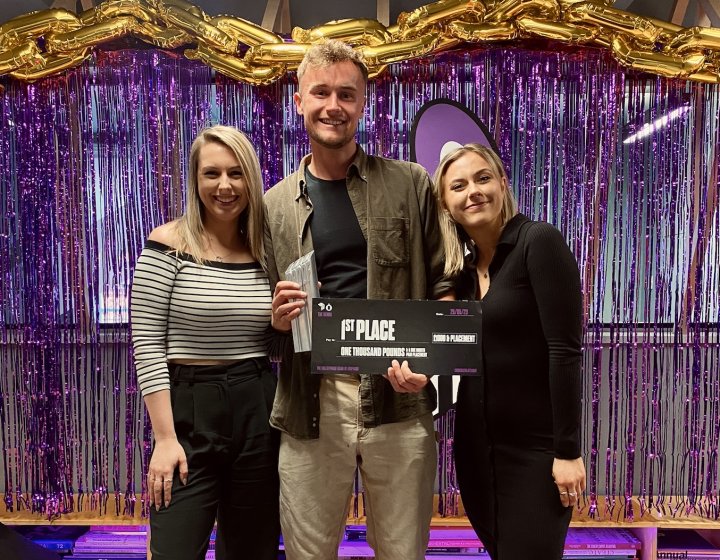
Falmouth graduate’s vodka brand design wins Bulletproof 100%Proof competition
09 August 2023
Graphic Design BA(Hons) graduate Murray Harden has won this year’s Bulletproof 100%Proof competiti...
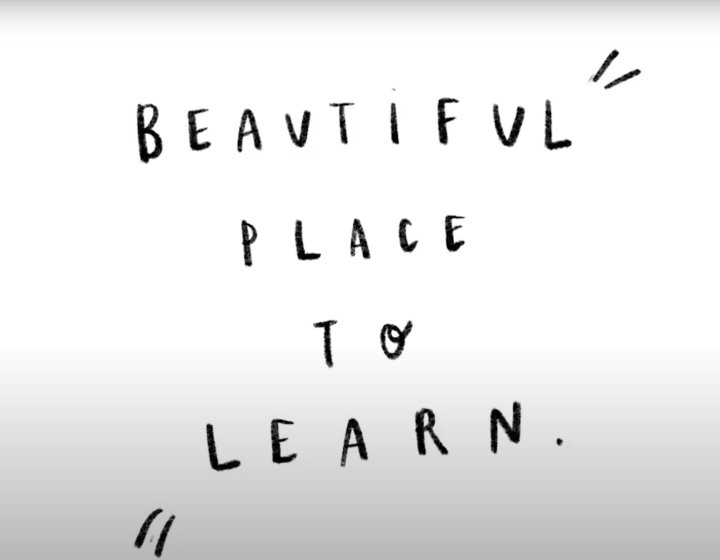
Graphic Design at Falmouth University: 60 second shorts
01 August 2023
Our Graphic Design BA(Hons) graduands were recently tasked with creating 60-second videos that perfe...
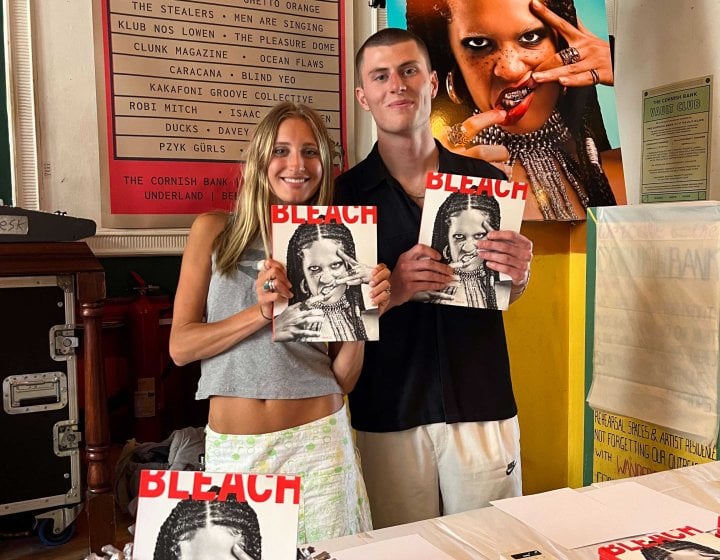
Monty and Alex at the Bleach Magazine launch at Cornish Bank in Falmouth.
Falmouth duo launch dynamic new publication BLEACH Magazine
27 July 2023
With the first issue selling out in less than a month, BLEACH Magazine is clearly onto something. Co...

Exposé – A Force for Good: Student project supports local food bank
14 July 2023
Three Graphic Design BA(Hons) students recently launched their stage three project Exposé - A Force...

Exposé – A Force for Good: Student project supports local food bank
14 July 2023
Three Graphic Design BA(Hons) students recently launched their stage three project Exposé - A Force...
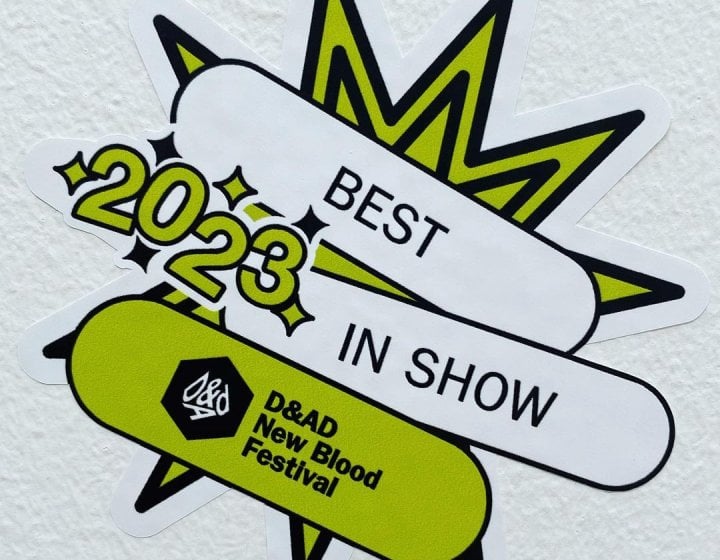
Falmouth University win big at D&AD Awards 2023
12 July 2023
Meet Falmouth's D&AD 2023 award winners and runner-ups
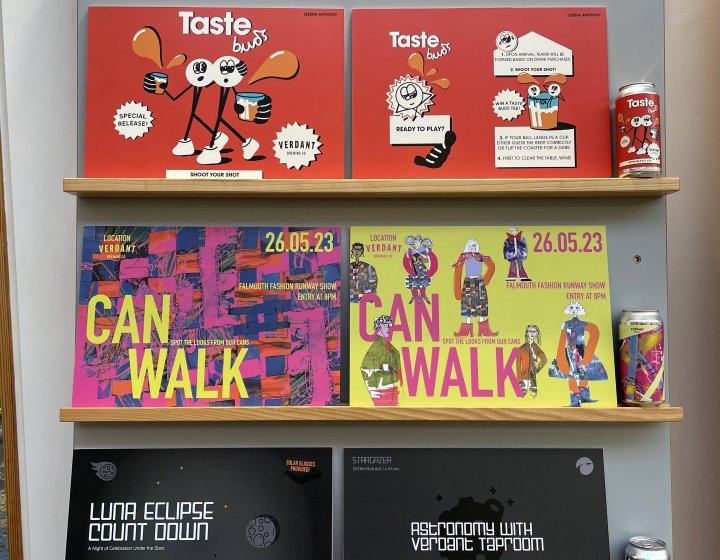
Brewing brilliance: Falmouth students respond to live brief set by Verdant Brewery
07 July 2023
Final-year students on Falmouth’s Graphic Design BA(Hons) course recently had the chance to work w...
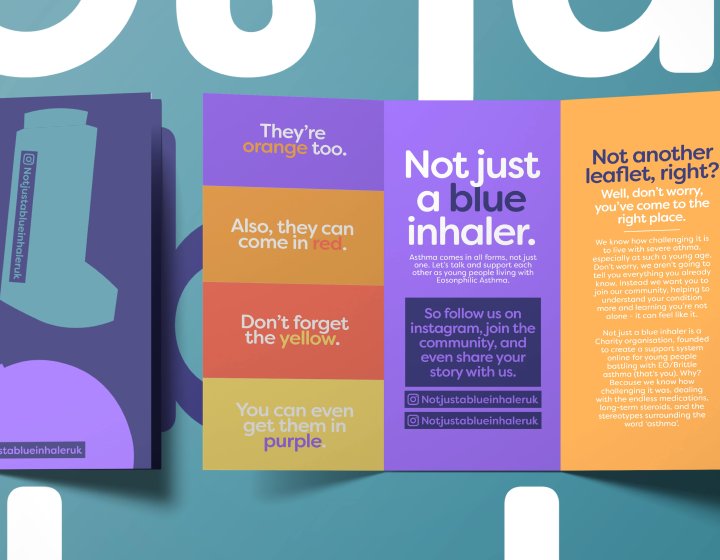
Image credit: Ava Rylands, Graphic Design BA(Hons) student
Final-year Graphic Design students present their portfolios to industry professionals
24 May 2023
Project and portfolio review sessions support students' next steps into industry.
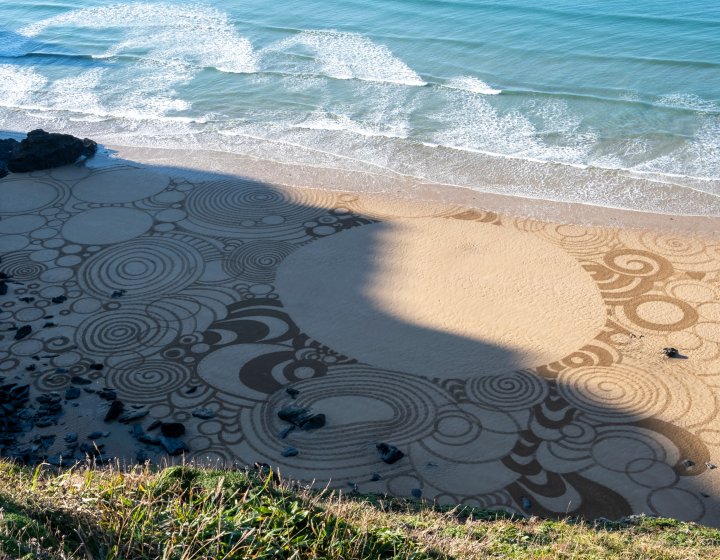
Image courtesy of Jenna Hinton and Emily Smith
Landscape art project aims to boost wellbeing and creative curiosity
09 March 2023
A Cornish ‘sand art’ master has coached a group of Falmouth University students through a projec...
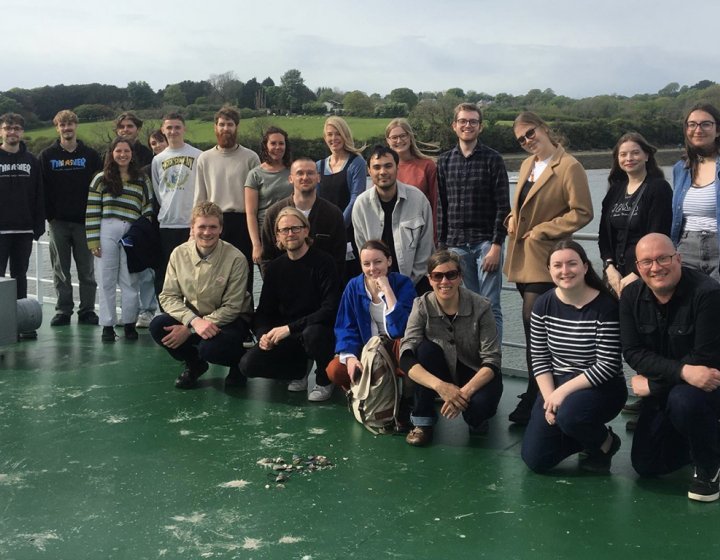
Design for Good Summer School: From Falmouth with Love
29 June 2022
The Design for Good Summer School gave sixteen final year BA Graphic Design students the opportunity...
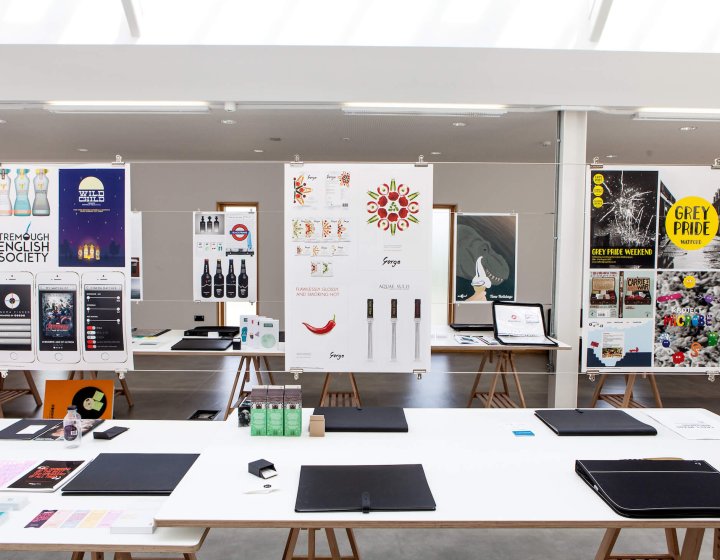
Why I chose to study Graphic Design
08 March 2022
What I enjoy about Graphic Design at Falmouth is the celebration of creativity. Students are encoura...
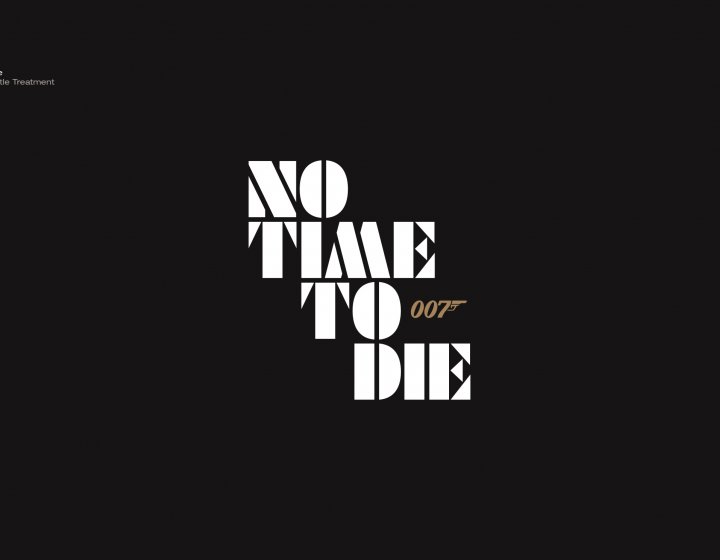
No Time To Design: in conversation with Tom Brooks
28 October 2021
The Falmouth graduate has designed the logo for the latest instalment of the James Bond series. T...
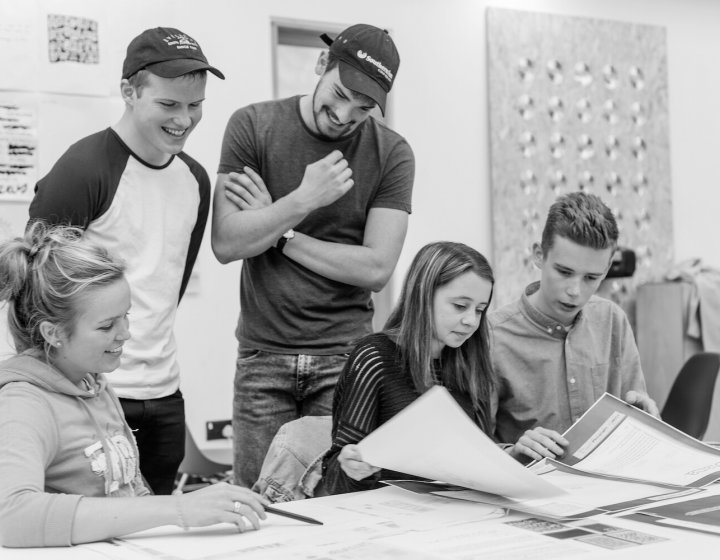
Creative Community initiative connects students with industry
18 August 2021
Final-year BA(Hons) Graphic Design students meet 120 leading designers and have over 500 industry me...
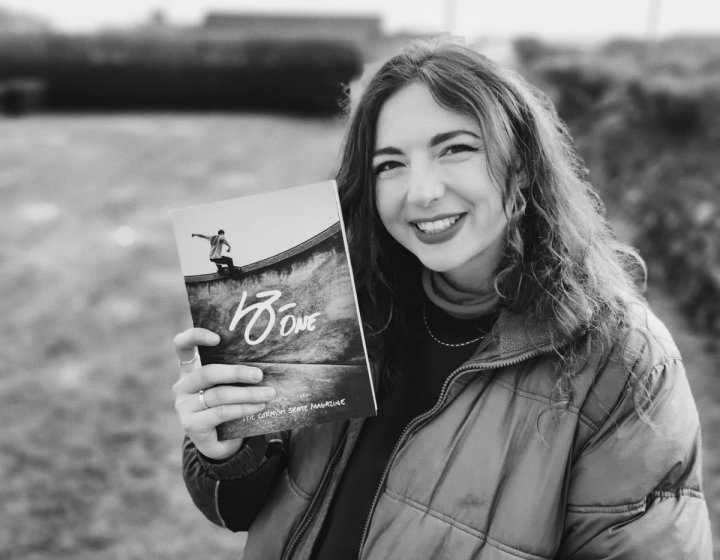
Students publish Cornish skating magazine, 48to1
12 April 2021
Graphic Design student Amber Rees and Press & Editorial Photography student Oscar Dryden have po...
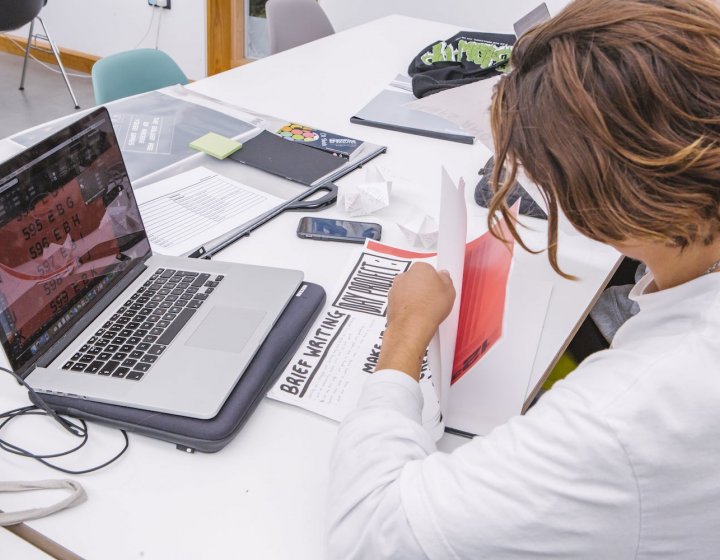
Graphic Design: Professional Practice Week
12 January 2021
Second year Graphic Design students were given a unique insight into the design industry as twelve l...
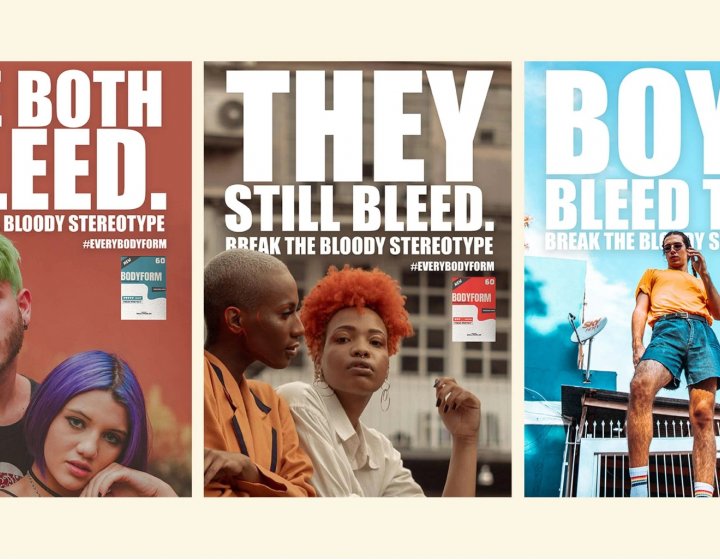
Emerging Talent Celebrated at Global Awards
14 July 2020
Falmouth University Graphic Design, Advertising and Illustration undergraduates and postgraduates ar...
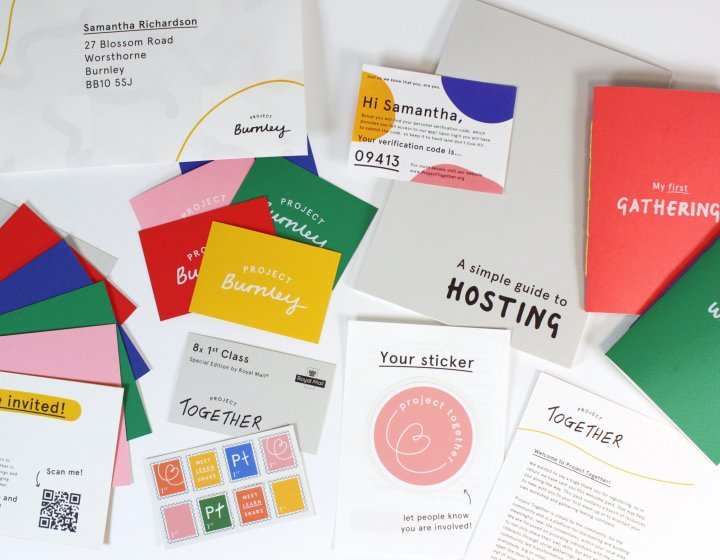
Students Storm The South West Digital Design Awards
09 July 2020
Graphic design students from Falmouth have scored a hat trick of wins at the South West Digital Desi...
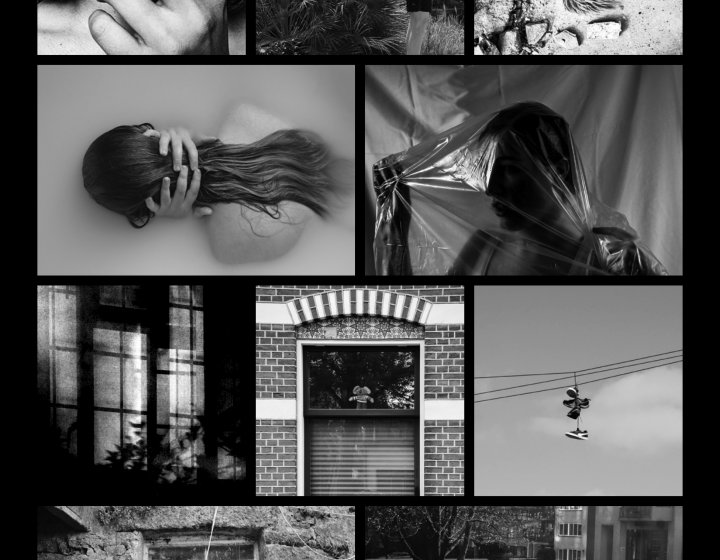
Students Explore Place and Identity
07 July 2020
In March 2020, NowHere was about to commence in London; Graphic Design students would enjoy a series...
Careers
Our graphic design graduates are working as:
- Junior Designers working in editorial & publishing, branding & packaging, ethical & digital innovation, in some of the world’s leading agencies, including; AKQA, Superunion, Apple, Design Bridge, SomeOne, Made Thought, Jack Renwick Studio, Prophet and Mother.
- Freelance Designers working across a broad range of generalised and specialised subject disciplines, including; Graphic Design, UX/UI Designers, Design Strategists, Content Developers, Artworkers and Motion Designers in both the UK and abroad.
- Broader subject-specialists, including; Design Writers, Illustrators, Photographers, Film-makers and Archivists. Several continue each year to pursue post-graduate study or take the first steps toward working within education (Primary through to Higher).
- Many students have gone on to establish their own studios. Recent national successes include; Rockabye, Wolfe Hall, Thoughtful Standard, and Studio Kiln. Some also decide to work within very niche areas (design-for-film), in politics (as campaign leads) or for NGOs (inc. British Red Cross). We even have a Rock Star.
What can you do with a design degree?
A degree in a design subject also offers multiple industries to work in. Sectors such as advertising, branding, publishing, product design and interior design all require people with strong and adaptable creative skills.
Explore graphic design careers
How to apply
Ready to join us? You can apply for September 2024 through UCAS. You'll need to reference the course and University code (F33).
| Course route | UCAS code |
|---|---|
| Graphic Design BA(Hons) three year degree | W214 |
| Graphic Design BA(Hons) with Integrated Foundation Year | FY08 |
| Graphic Design BA(Hons) with professional placement | PY48 |
We consider all applications on their own individual merit and potential. We invite all applicants to an interview day or audition to give them the opportunity to demonstrate this along with what inspires and motivates them in their field. Applicants will also be able to show their portfolio or give a performance depending on the course. We welcome applications from all subject backgrounds, whether you’ve specialised in STEM, the arts or humanities.
| Course route | Entry requirements |
|---|---|
| BA/BSc(Hons) three year degree | 104 – 120 UCAS Tariff points |
| BA/BSc(Hons) four year degree with professional placement | 104 – 120 UCAS Tariff points |
| BA/BSc(Hons) four year degree with Integrated Foundation Year | 80 – 120 UCAS Tariff points |
Check the title of your course to see if it's a BA or BSc award. UCAS Tariff points will primarily be from Level 3 qualifications such as but not limited to A-levels, T Levels, a BTEC/UAL Extended Diploma or a Foundation Diploma.
For applicants whose first language is English we require you to have or be working towards GCSE English Language Grade 4 (C), or equivalent.
If English is not your first language you will need to meet the same standard which is equivalent to the IELTS Academic 6.0 overall score, with at least 5.5 in Reading, Writing, Speaking and Listening. We accept a range of in country equivalencies and approved tests.
If you need a student visa to study in the UK, you may need to take a recognised language test. You can read our English Language Requirements for more information.
For starting your studies in 2024
UK applications: 31 January 2024 (for equal consideration)
Applications after the 31 January will be considered on a first-come, first-served as long as there are places available. Apply for this course now.
International fee payers
International fee payers can apply throughout the year. But we recommend applying as early as possible, to make time for visa and travel arrangements.
Fees, costs & funding
Tuition fees for September 2024 entry
| Annual tuition fee | Student |
|---|---|
| £9,250 per year | Full-time UK |
| £17,950 per year | Full-time EU/international |
| £1,850 per professional placement year | Full-Time UK and EU/international |
Tuition fees for September 2025 will be confirmed in summer 2024.
Tuition fees are set annually and are subject to review each year. The University may therefore raise tuition fees in the second or subsequent years of a course, in line with inflation and/or the maximum permitted by law or Government policy. Students will be notified of any changes as soon as possible.
The figures above don't include accommodation and living costs
Typical course costs
Recurring annual costs
£200 per year for basic studio materials (such as: academic diary, sketchbook, metal ruler, scalpels, pens, pencils, USB stick, masking tape, glue, eraser etc.)
Recurring printing costs
£100–£300 per year
One-off costs for the duration of the course
A personal laptop, approx. £750 - £1,200
Adobe Creative Cloud
You will need access to Adobe Creative Cloud. You may be eligible for discounted licenses through Adobe's education pricing and Falmouth University seeks to provide further discounts when possible. If any discounts are available, we will communicate these to you.
For more information please visit Adobe Creative Cloud.
Optional study trips
Approx £100-£1000 (depending on location)
- £250 for materials
- A laptop/desktop computer
- Adobe Creative Suite
To engage in the digital learning activity, although you will be able to access IT suites on campus, you will benefit from a laptop to access the platforms and tools we use. Depending on your subject, you may need a specific type of computer. If you're unsure about what you might need, please contact our course advisors.
Funding
For information about funding available, please visit our student funding pages.
Ask a student
What better way to find out about life at Falmouth University than by asking our current students?
From course details and academic support, to the social scene and settling in, our students are ready and available to answer any questions you might have. Simply set up your account, send them a question and they'll get back to you within 24 hours.
Similar courses
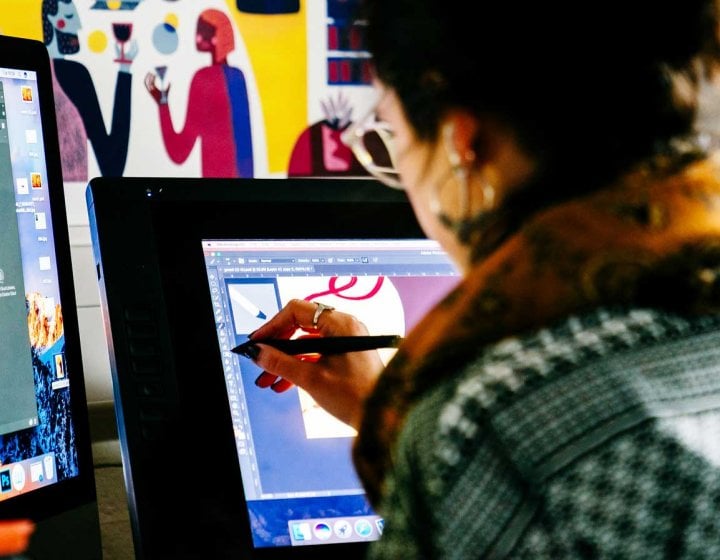
Visual Communication BA(Hons) (Online)
Get ahead in the vibrant, ever-evolving field of visual communications with this exciting online cou...
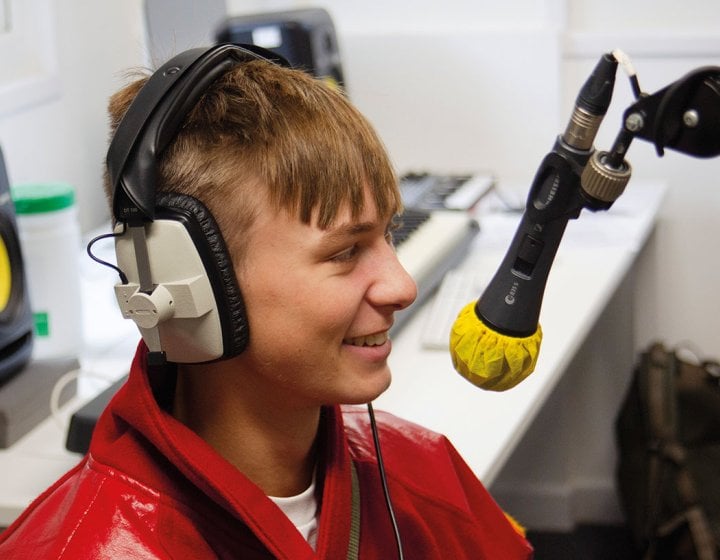
Media Production BA(Hons)
An exciting and market-driven fusion of filmmaking, advertising and journalism, this Media Productio...

Business & Marketing BSc(Hons) (Online)
Become a skilled, confident, ethical and future-ready business and marketing professional with this ...
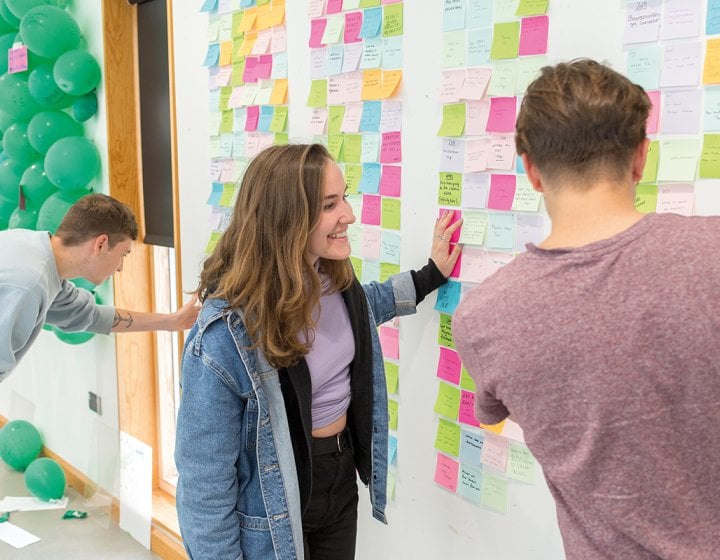
Marketing Communications BA(Hons)
In a world where technology is transforming how we live, work and play, marketers must be fast, flex...

Commercial Photography BA(Hons)
From creating photographs and films for high-end advertising and marketing campaigns to producing vi...
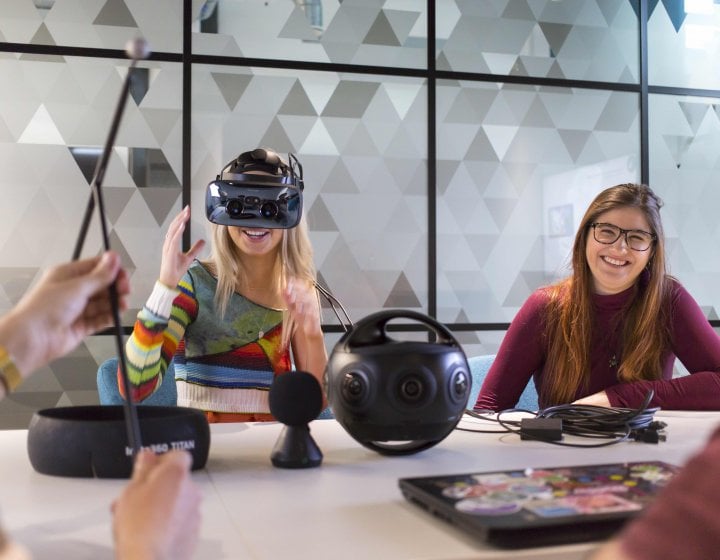
Business & Digital Marketing BSc(Hons)
Prepare yourself for a career in the fast-paced and ever-evolving world of business and digital mark...
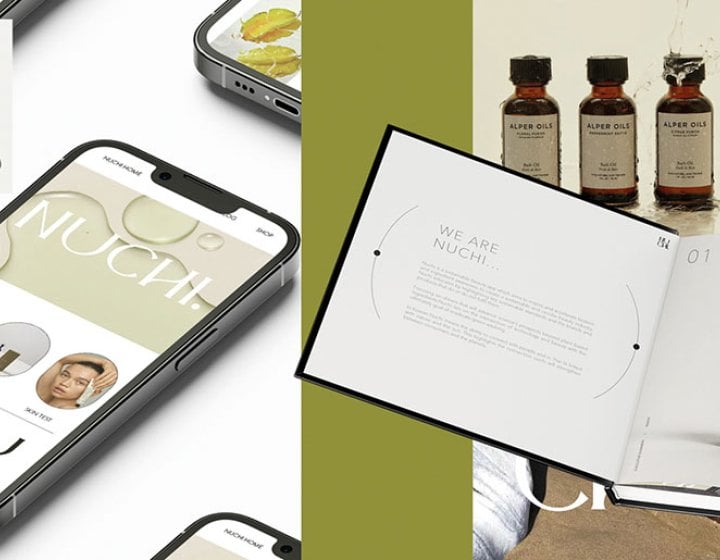
Fashion Marketing BA(Hons)
Blend your flair for communication and eye for fashion into a successful career as a fashion markete...
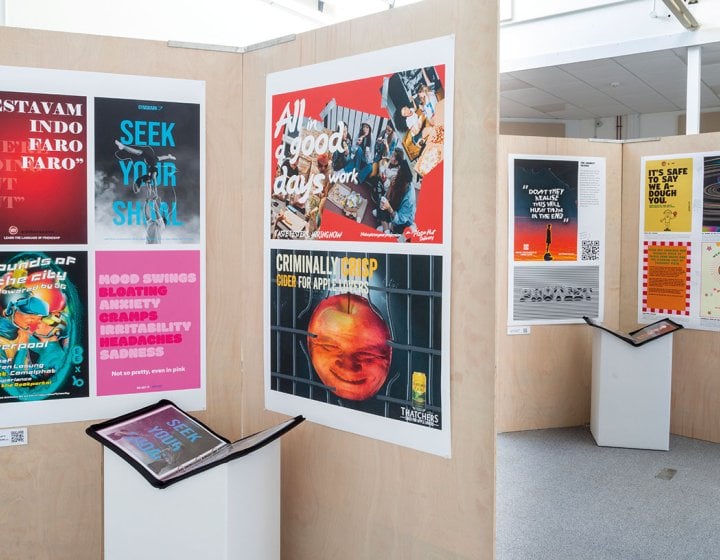
Creative Advertising BA(Hons)
Turn your ideas into powerful advertising campaigns with impact.
Open Days and events
From visiting campus to online application advice, get all the information you need about joining our creative community.
Find an event
